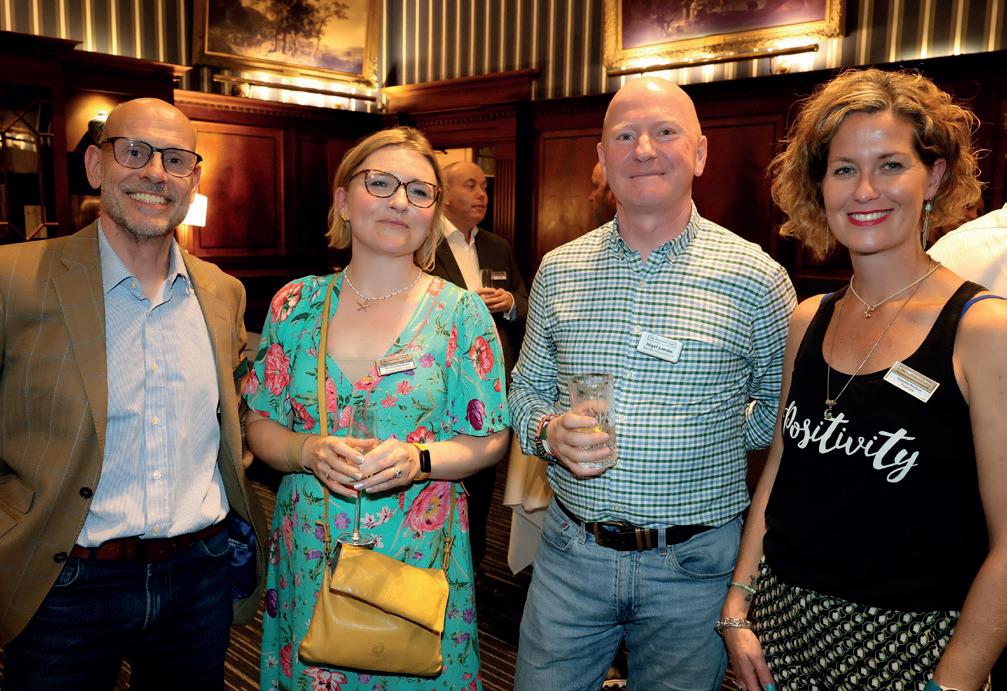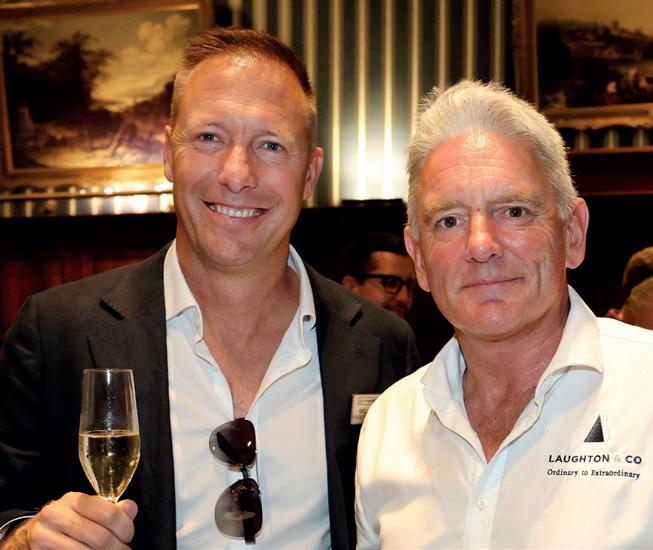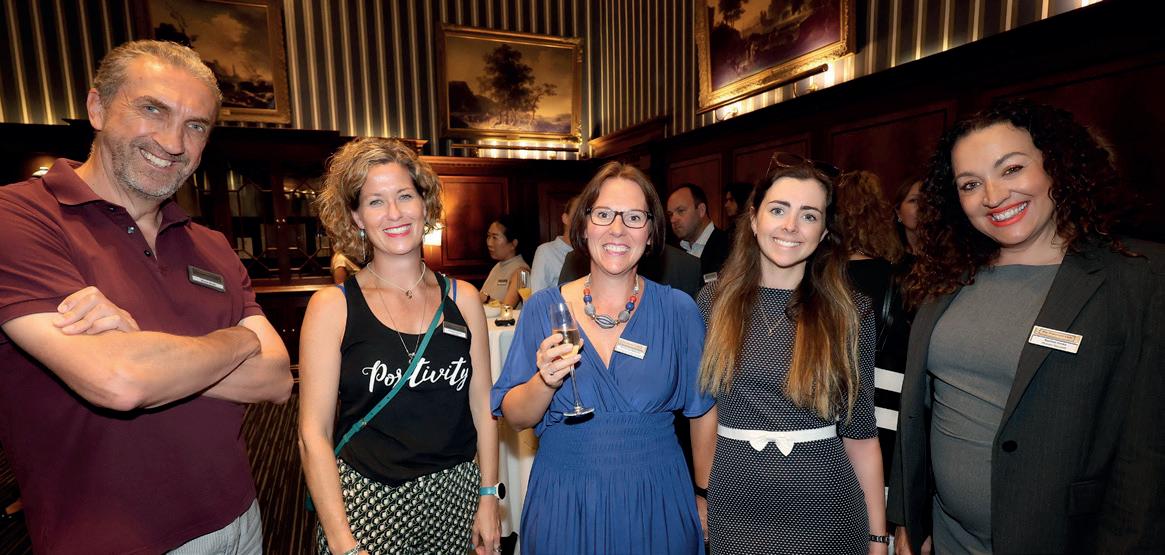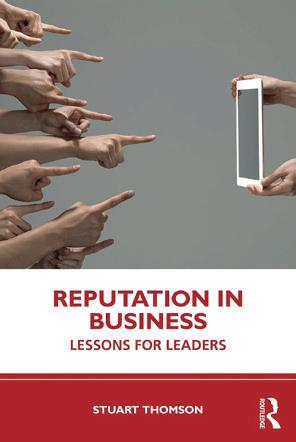




Leading with purpose

Navigating the planning maze

MOTORING Type R




Investing









The allure of dark tourism







Leading with purpose

Navigating the planning maze

MOTORING Type R




Investing









The allure of dark tourism





































We help turn your spark into reality.






























































Expert financial advice to ensure your future shines bright







Whether you’re looking for ideas on growing your money, planning for retirement or leaving a financial legacy for your loved ones, we’ll guide you with personalised financial planning and investment management, so you can look to the future with confidence.




Speak to us to find out how our ideas can help make your ideas a reality.
Contact our Royal Tunbridge Wells office to arrange an introductory meeting with Paul Cannons Call 01892 739580 or email paul.cannons@brewin.co.uk brewin.co.uk/royal-tunbridge-wells














value of investments can fall and you may get back less than you invested.

STORY
24 Prince William
The prince has filmed a series for the BBC highlighting work carried out by conservationists around the world. He also chatted with Sir David Attenborough about ‘The Great Garbage Patch’
8 National news
A round up of important business stories from around the world
10 Local news
A look at the business news stories across the South East
6 The Platinum Club
Now in its 16th year, it remains the preeminent networking forum in Sussex.
12 Central South Business Awards
All the winners, finalists and highlights from this Platinum showpiece event, recently held in Southampton

22 Brighton & Hove Business Awards
As the weeks count down, judging has taken place. Finalists to be announced next month!
32 Speedee Boarding Challenge
All the thrills, spills and splashes from this fundraising aquatic event which took place on Hove Lagoon
36 Surrey Business Awards
The prestigious awards return for 2025, with the entry deadline approaching fast
52 Sussex Business Awards
Back for their 37th year, the Sussex Business Awards 2025 are launched
40 Help To Grow
Enrolments are invited for the 12-week course this autumn
42 Influencers Forum
Five leading experts discuss the issue of investing in the future
50 MDHUB
Meet John Thacker, MDHUB’s very own bookworm
54 Cleankill
Meet Beth Pemberton-Hill, and her passion for dealing with pests...
30 DMH Stallard
Navigating the planning permission maze
34 DMH Stallard Commentary
Jonathan Grant on M&A dealmakers and dealbreakers, and the pitfalls of the new Inheritance Tax rules
38 Mayo Wynne Baxter
Is it time to update your Will? The importance of keeping key documents up to date
20 Kreston Reeves
The company has launched its ESG advisory and reporting service
56 The allure of dark tourism
Tess de Klerk looks at the macabre notion of visiting the sites of some of the world’s most horiffic natural and man-made disasters
60 Honda Type R
Maarten Hoffmann goes all nostalgic to find a new ‘old-school, front-wheel drive hot hatchback largely unchanged since the 1990s








Welcome to the July issue of Platinum.
As summer seems to be here, l was irritated to hear that we have passed the midway point of the year and some are talking of the number of days until Christmas. I was close to crashing the car and shooting the radio when this came on! Is it just me or does it seem like we have only just got the year underway.
What this tells us all is that the days and weeks fly by, and there is absolutely no point in putting off today what can be done tomorrow - as tomorrow will be here in a flash.
In this issue, we present all the winners of the Central South Business Awards 2025, held in Southampton on July 2nd, in a stunning show in front of a totally sold-out audience – and the winners’ cheers and smiles would have brought tears to your eyes. Kreston Reeves talk about their launch of a new ESG Advisory Service and DMH Stallard help to navigate the planning permission maze.
Our Big Story features the two rather well known characters - Prince William and Sir David Attenborough talking on a subject that is rather important - saving the planet!
Platinum is still offering to underwrite all places on the University of Brighton Help to Grow Programme - a mini MBA that will make a real impact on how you run your business - and via Platinum, it’s FREE. The long-running Influencers Forum returns with five local experts discussing investing for the future – and it was a fascinating debate.
In Travel, we look at Dark Tourism, while in Motoring, we bid farewell to the Honda Type R. With Awards season being upon us, we also look at the 17th year of the Brighton & Hove Business Awards, and launch the Sussex Business Awards 2025. The old adage is correct – you really do have to be in it to win it.
info@platinummediagroup.co.uk
PUBLISHER/EDITOR: Maarten Hoffmann maarten@platinummediagroup.co.uk
COMMERCIAL DIRECTOR: Lesley Alcock lesley@platinummediagroup.co.uk
EVENTS DIRECTOR: Fiona Graves fiona@platinummediagroup.co.uk
TRAVEL EDITOR: Tess de Klerk tess@platinummediagroup.co.uk
PLATINUM MOTORING EDITOR: Maarten Hoffmann maarten@platinummediagroup.co.uk
DYNAMIC MOTORING EDITOR: Fiona Shafer fionas@platinummediagroup.co.uk
HEAD OF DESIGN / SUB EDITOR: Alan Wares alan@platinummediagroup.co.uk




SIMPLY THE MOST EFFICIENT AND FUN EVENT IN THE REGION. THE ONLY NETWORKING EVENT I EVER ATTEND ❜❜ MERCEDES-BENZ
THE PLATINUM CLUB IS A REALLY WELL ORGANISED NETWORKING GROUP, WITH THE HOSTS HELPING TO FACILITATE TO ENSURE WE ALWAYS MAKE USEFUL NEW CONTACTS AT EACH EVENT ❜❜ LLOYDS BANK

ALL BUSINESS IS BASED ON RELATIONSHIPS, AND PLATINUM GIVES YOU THE PLATFORM TO CREATE THE MEANINGFUL HUMAN CONNECTIONS THAT MATTER ❜❜ BAILEY & FRENCH






We meet once per month, excluding August. If you would like to attend an event, please get in touch info@platinummediagroup.co.uk
As annual membership is no longer required, we look forward to welcoming you to the most effective, enjoyable and lively networking group in the South
❛❛ WE SEE THE PLATINUM CLUB AS AN IMPORTANT AND INTEGRAL PART OF OUR BRAND AWARENESS STRATEGY, THROUGH INTERACTIONS WITH WELL CONNECTED BUSINESS PEOPLE AND OTHER INFLUENCERS. IT IS WELCOMING AND GREAT FUN TOO! ❜❜ MATTIOLI WOODS

Banknotes issued by the Bank of England are about to get their first major redesign in more than 50 years.
Notable historical figures, such as Sir Winston Churchill, who is featured on the current fi ve pound note, have been on these banknotes since 1970, but could be on the way out.
The public is being asked for their views on new themes, such as nature, innovation, or key events in history. Early suggestions have featured ideas from a variety of British nostalgia, such as Stonehenge, the Elizabeth Tower, vintage trains, several ships, and Basil Fawlty.
Heathrow Airport is considering legal action against National Grid after a report found the fire, which caused the airport to shut down, was a result of a known fault at an electrical substation.
An investigation found that National Grid, which owns the substation which supplies Heathrow, had been aware of a problem since 2018 but failed
to fix it. There were numerous opportunities to rectify moisture affecting electrical parts at the North Hyde substation, but maintenance was repeatedly deferred, the report said.
“Those failings that resulted in significant damage and loss for Heathrow and our airlines,” a spokesperson for Heathrow commented.
The TSB name could disappear from UK High Streets after the British bank’s Spanish owner announced its sale to rival Santander.
The £2.65bn deal still has to be agreed by the current owner Sabadell’s shareholders, but if it does go ahead, Santander said it “intends to integrate TSB in the Santander UK group”.
The takeover would create Britain’s third largest bank by share of personal current accounts. Santander’s chief executive Mike Regnier said “we haven’t made any decisions yet” but “we tend to use the Santander brand on the high street around the world”.
UK house prices recorded their biggest monthly fall for more than two years in June, according to mortgage lender Nationwide.
Prices fell by 0.8% last month, the sharpest decline since February 2023, which the building society said may reflect weaker demand following the
changes to stamp duty in April.
Over the year, prices rose 2.1%, although that was the slowest annual growth rate in nearly a year. However, Nationwide said it expected activity in the housing market to pick up in the months ahead.
❛❛ The day they handed out patience, I left because it was taking too long ❜❜ Anon
Energy prices fell on July 1st for 21 million households in Britain, but uncertainty remains over whether costs will stay down for winter.
The bill for a household using a typical amount of gas and electricity is dropping by £11 a month, under regulator Ofgem’s latest price cap.
While billpayers have welcomed the 7% cut, there is concern that bills will still hit hard later in the year when it is colder and darker.
People are being encouraged to shop around to see if a fixed deal, which could provide more certainty over payments, would be more suitable.
Some people who pay into a Lifetime Individual Savings Account (LISA) may end up getting less money out than they put in, MPs have warned, as they call for the product to be reformed. Anyone under 40 can open a LISA to
either help save towards retirement or buy a first home. Savers can put in up to £4,000 a year and the government will top it up by 25%. However, the Treasury Committee stated that if LISA funds are withdrawn early due
to unforeseen circumstances, the charges mean people may lose 6.25% of their savings. It also warned that the “complex” product may not suit everyone, and it might have been missold to people on certain benefits.
❛❛ Religion was invented when the first con man met the first fool. ❜❜
Mark Twain
The number of electric car sales rose 34.6% to 224,838 units in the first six months of the year, according to preliminary data from the Society of Motor Manufacturers and Traders (SMMT), a lobby group. New car sales rose 6.8% year-onyear in June to 191,200 units, the best sales figures for the month since 2019. A quarter of all June sales, or nearly 47,400, were electric. Ford achieved the fastest growth in UK electric car sales. British electric car sales rose by a third in the first half of 2025 after the strongest June for overall car sales in six years.
Mobile phone blackspots will be eliminated on several major railway lines and train tunnels by 2028, the body which runs Britain’s railway infrastructure has pledged. Network Rail, which is owned by the government, has signed a deal with two private telecoms firms in a move it claims will see 4G and 5G connectivity boosted on trains and in stations.
The chair of the US Federal Reserve, Jerome Powell, has blamed Donald Trump’s tariffs for preventing the immediate interest rate cuts the president has demanded. Trump has repeatedly urged Powell to reduce borrowing costs in the US economy. Trump whined, “Anybody would be better than J Powell. He’s costing us a fortune because he keeps the rate way up.” Powell recently said, “We went on hold when we saw the size of the tariffs. All inflation forecasts for the US increased materially as a consequence of the tariffs. We didn’t overreact; in fact, we didn’t react at all.” Sources are now saying Trump wants to sack Powell; whether he can is unclear.
Britain’s largest retailers are warning that food prices are being driven up by hot weather hitting harvest yields, as the recent UK heatwave pushes temperatures close to record levels.
The British Retail Consortium (BRC) said rising fruit and vegetable
prices had contributed to a jump in food price inflation in June, while retailers also passed on tax rises and employment costs to consumers.
Drawing a direct link between the climate crisis and shop prices for
The Department for Transport (DfT) said work was set to begin next year and claimed it would “transform” journeys for passengers who have experienced calls cutting out and weak internet connections. The project is expected to take three years because works can only occur when trains are not running on tracks.
The 4 Day Week Foundation, a group campaigning for more businesses to take up shorter working weeks has found all 17 British businesses taking part in a six-month trial of the four-day week will continue with an the arrangement. The 1,000 British workers involved in the trial will keep a shorter working week after the latest trial changes to traditional working patterns. All the employees remained on full salary. The latest test follows a larger six-month pilot in 2022, involving almost 3,000 employees, which ended with 92% of participants reducing their hours from a five-day working week.
British consumers, the trade body representing more than 200 major UK retailers said “hot, dry weather reducing harvest yields” had fuelled some of the rise in prices.
Engineering company Ricardo has been bought by WSP Global – a Canadian professional services firm.
Ricardo’s headquarters are located at Shoreham Technical Centre, adjacent to Brighton City Airport, and works to ‘put a sustainable future in reach’ by ‘creating innovative services’ that are at the ‘intersection of transport, energy and environment agendas across the globe’.
A WSP statement released in June said, “WSP, one of the world's leading professional services firms, announces that it has reached agreements to acquire the entire issued and to be issued share capital of Ricardo plc for 430 pence per share. The acquisition underscores WSP's commitment to expanding its footprint in high-growth sectors worldwide.
Plus Accounting has announced the retirement of Paige Collins, founder of Warren House Chartered Accountants, following her recent decision to step away from her consultancy role due to health reasons. Known for her hands-on approach and long-standing client relationships, Paige has been a fixture of the local professional landscape for many years.

In April 2025, Warren House officially joined forces with Plus Accounting, with Paige staying on in a consultancy role to support clients through the transition. Her input during this period was fundamental in ensuring a respectful handover, and she remained committed to maintaining the high standards her clients expected.
❛❛ People often say that motivation doesn’t last. Well, neither does bathing – that’s why we recommend it daily. ❜❜
Zig Ziglarn
West Sussex solicitors Bennett Griffin has announced the promotion of four team members who have each played an important role in the firm’s journey. The four internal promotions are Chrissie Edwards, Head of the Property Department, becomes a Partner; Joshua Coleman, Deputy Head of the Property Department, promoted to Partner; Gema West, Deputy Head of the Private Client Department and Head of Wills & LPAs, promoted to Partner; Kelly Brown, Wills, Trusts & Probate Services, promoted to Senior Associate. Kate Hallin, Managing Partner, said: “It’s brilliant to see all four recognised for all the hard work they’ve put in. Each of them brings something unique to the team, and their promotions are so well deserved.”
Cruise industry giants have teamed up with three colleges to highlight the sector as an exciting, rewarding career pathway for school leavers. This included 12 Travel and Tourism students at Nescot College in Ewell, who have just completed their first Cruise Career Springboard programme. The programme allowed them to dip their toes into a potential career in the cruise sector by visiting several incredible ships, hearing from industry leaders, and seeing head office and shoreside roles in action. The programme was developed by Edwina and Matthew Lonsdale at Mundy Cruising and has been supported by key industry figures, who have come together to invest in the next generation.
Worthing’s leading social care charity, Guild Care, has recently unveiled Holland House, a dynamic new Community Hub Campus situated in the heart of Worthing.
Marking the first in a series of signature events, the launch welcomed an exclusive gathering of over 50 individuals, including prominent business leaders, generous philanthropists, respected
community figures, and longstanding Guild Care members.
Guild Care has been supporting the community since 1933. It supports older people, people living with dementia, and children and adults with learning disabilities to live safe, secure, and fulfilling lives. Its mission is to reduce isolation and stigma by delivering accessible, compassionate care.
East Sussex County Council is considering hiring specialist accountants to help it deal with financial difficulties and potentially apply for government support.
Councillor Nick Bennett, lead member for resources and climate change, will decide on Tuesday whether to commission a £40,000 review by the Chartered Institute of
Public Finance and Accountancy (CIPFA). The council faces a potential deficit of more than £37m in the 2026/27 financial year. In a report, officers said a CIPFA review would likely be required should the council approach the Ministry of Housing, Communities and Local Government to explore options for Exceptional Financial Support.
❛❛ You beating yourself up is like Woody Allen playing the clarinet. I don’t want to hear it.” ❜❜
Ted Lasso
Artificial Intelligence (AI) deployed in the sewer system has helped prevent flooding in West Sussex homes, Southern Water says.
AI learns the normal behaviour of sewers and can distinguish between morning and evening rushes, rain in the system, and the formation of a blockage.
Digital sensors in a sewer at East Lavington, near Petworth, on June 16th detected a blockage caused by a fatberg, which was subsequently dealt with before gardens and homes flooded with wastewater.
According to Southern Water, one of the region’s top polluters, blocked sewers are the single biggest cause of pollution incidents. However, AI has now reduced internal flooding by 40% and external flooding by 15%.

Gatwick Airport has launched a new “first of its kind” route to Africa. The new route from the Sussex airport is a direct service to Nairobi with Kenya Airways, and marks the only non-stop connection between London Gatwick and the Kenyan capital. Gatwick has said it will open more doors for “trade, tourism, education and strengthening the
vital connections between Kenya and the UK”. The new service is a key milestone in its strategy to “enhance connectivity with highgrowth markets across Africa”, and will be a three-weekly service between Gatwick and Nairobi. It follows the recent addition of four flights a week to Entebbe in Uganda. The airport now serves 19 destinations across the continent.
Rogue landlords who let their properties on websites such as Airbnb but dodge tax and business rates and breach regulations are to face a crackdown in Brighton & Hove.
The city council’s cabinet agreed to lobby the government for the power to license landlords and called on ministers to change planning rules when it met in June.
The authority wants a clearer idea of the extent of the sector in Brighton & Hove, where thousands of properties are advertised on short-term holiday letting sites.
Up to 6,000 homes are being advertised as holiday lets in the city, on platforms such as Airbnb and Booking.com, but only 400 are registered as businesses.
Dwelly, a lettings acquisition and planning specialist, has announced its fourth agency acquisition with the purchase of a Brighton business founded over 30 years ago.
It has acquired Parks Residential in Brighton, adding 450 units to its portfolio, alongside a team with decades of experience serving landlords and tenants.
Dwelly now manages more than 2,500 units, following previous acquisitions in Yorkshire, Essex, and Suffolk, with a goal to surpass 10,000 units under management by the end of 2025. Sam Humphreys, head of M&A at Dwelly, said: “Parks Residential is exactly the kind of business we want to partner with, respected, deeply rooted in the local community and known for delivering high-quality service.






















DORSET























The winners of the 2025 Central South Business Awards, held in partnership with Business South, have been officially announced.
A sold-out audience gathered on July 2nd at the Leonardo Royal Hotel Grand Harbour in Southampton for a prestigious black-tie ceremony hosted by acclaimed comedian Suzi Ruffell. The evening brought together hundreds of guests from across the region to celebrate business excellence, innovation and success.




Maarten Hoff mann, Managing Director of Platinum Media Group and organiser of the event, commented: “The calibre of entries this year was exceptional. It’s truly inspiring to witness the incredible work being carried out by businesses across the Central South.


This year’s awards recognised achievement across 15 diverse categories including Customer Service, Innovation, Construction, Startups and Professional Services. The night’s highest accolade, Company of the Year, was awarded to Hampshire-based Rund Partnership, a leading surveying and construction consultancy.



“Selecting the winners was no easy task - every finalist should feel immensely proud of their achievements.”
Thanks to the generosity of sponsors and guests, just over £6,000 was raised for Heartbeat, a charity dedicated to improving cardiac care in Hampshire. The funds will help provide specialised equipment, facilities and services for patients and their families at the Wessex Cardiac Unit at University Hospital Southampton, as well as support research and pioneering projects to advance heart health.
























THANK YOU TO OUR






























BUSINESS GROWTH AWARD
Sponsored by Blake Morgan LIONEL HITCHEN

❛❛ Congratulations to all winners and to the Platinum for a fantastic event! ❜❜ Onecom




BEST CUSTOMER SERVICE AWARD
Sponsored by HDSC
TAILOR MADE TECHNOLOGIES

TECHNOLOGY ADVANCEMENT AWARD
Sponsored by Openshaw & Co NUCLEOLUS SOFTWARE

❛❛ What a brilliant night! The event was superbly organised and choreographed.

I had great conversations and heard inspiring stories from so many businesses in the region. ❜❜
Southampton Solent University



INNOVATION OF THE YEAR
Sponsored by Southampton Solent University LIMETOOLS

LARGE BUSINESS OF THE YEAR

Sponsored by Occupational Health Consultancy RIDGE AND PARTNERS




❛❛ The award is testament to the professionalism and commitment of our people, both at our Winchester o ce and across the business. Here’s to continued growth, collaboration and impact. ❜❜ Ridge and Partners







COMMUNITY HERO AWARD
Sponsored by Heartbeat RIGHT AT HOME PORTSMOUTH




❛❛ This recognition means the world to us. Our work is all about making a di erence in people’s lives and being celebrated for that is truly humbling.❜❜
Right at Home Portsmouth
BEST NEW BUSINESS AWARD
Sponsored by Business South ECHO AI
❛❛ This is a huge moment for us. When we started Echo, our goal was simple: help teams run better meetings with smarter tools and less wasted time. To see that vision recognised like this means so much. ❜❜
Echo AI


❛❛ We walked away with pride, with joy and with a reminder progress often looks like quietly moving up the table, step by step, without always shouting about it.
The show itself was outstanding. energy, the professionalism, the atmosphere – all top class.❜❜
Citrus Facilities Management





FUTURE TALENT OF THE YEAR
Sponsored by Dynamic Magazine
BECKY RAYNER, SAVILLS SOUTHAMPTON







CONSTRUCTION PROJECT OF THE YEAR



Sponsored by Moneycorp MORRISH HOMES


❛❛ A very well organised event, which ran slickly from start to finish. ❜❜


Morrish Homes



❛❛ The standard of entries was seriously impressive and it’s always uplifting to see businesses being celebrated for amazing achievements, which might otherwise fl y under the radar. ❜❜
SME BUSINESS OF THE YEAR

Sponsored by Dutton Gregory BARNBROOK SYSTEMS


❛❛ This isn’t just a trophy. It’s a signal that transformation works.❜❜
Barnbrook Systems

Hollands Associates


BUSINESSPERSON OF THE YEAR
Sponsored by Lester Aldridge
DARREN RIDGE RIDOWN GROUP







INTERNATIONAL BUSINESS OF THE YEAR
Sponsored by ISON Travel LIONEL HITCHEN

EMPLOYER OF THE YEAR
Sponsored by City of Portsmouth College MORGAN SINDALL CONSTRUCTION


❛❛ We have worked really hard in the South to shape our business to the needs of our employees, creating opportunity, giving support and making sure we have some fun along the way. This award recognises everyone’s e orts and what a great team we have.❜❜
Morgan Sindall



PROFESSIONAL SERVICES AWARD
Sponsored by Growth Animal Marketing RUND PARTNERSHIP
COMPANY OF THE YEAR

❛❛ While we may not have taken home the win this time — we’re incredibly proud to have been part of an evening celebrating the best in business across the Central South. Huge thanks to Platinum for putting on such a brilliant event. ❜❜


Sponsored by Tetra Tech RUND PARTNERSHIP
ThinkEngine

❛❛ While we didn’t come away with the win, being named a finalist is a fantastic reflection of the passion and dedication our team puts into supporting our local community. ❜❜
Holiday Inn Southampton Eastleigh






By Dan Firmager, ESG Advisor, Kreston Reeves
In a world where the stakes for people and the planet have never been higher, we are proud to announce the launch of our ESG advisory and reporting services. We see this as a natural extension of our values, our expertise, and our commitment to helping clients create meaningful, measurable impact.
We are launching this service because the time for siloed thinking is over. Environmental, Social, and Governance (ESG) factors are no longer a ‘nice-tohave’; they are central to long-term business success. Yet, many organisations still struggle to understand and integrate ESG considerations into their core financial and strategic decision-making. Our new offering is designed to bridge that gap, helping clients embed ESG into the heart of their operations, reporting, and governance frameworks.
As a B Corp™ certified organisation, we hold ourselves to the highest standards of social and environmental performance, transparency, and accountability. This certification is more than a
badge. It reflects our belief that business can and should be a force for good while achieving economic success. With this belief comes a responsibility to support our clients in navigating the complexities of ESG, not just to comply with regulations, but to lead with purpose.
Our ESG advisory and reporting services are built to meet the growing demand for integrated, data-driven
ESG strategies that align with financial performance and stakeholder expectations. Whether you’re just beginning your ESG journey or looking to enhance your existing reporting frameworks, we offer tailored support across:
• ESG strategy development and materiality assessments
• Regulatory and voluntary reporting (e.g., CSRD, SECR, IFRS S1 + S2)
• Carbon footprint calculations
• Climate action plan development and implementation
❛❛ Our ESG advisory and reporting services are built to meet the growing demand for integrated, data-driven ESG strategies ❜❜

We understand that ESG is not a onesize-fits-all journey. That’s why our approach is collaborative, pragmatic, and grounded in your organisation’s context and goals. We work closely with leadership teams, sustainability officers, and finance professionals to ensure ESG becomes a strategic asset, not a compliance burden.
“Embedding ESG thinking through meaningful stakeholder engagement is at the heart of what we do,” says Dan Firmager, ESG Advisor. “It’s not just about producing reports but about driving
real change. To do that, we need to take the time to understand each business’s unique context, ensuring ESG becomes a lived part of the business, not just a line item.”
❛❛ The challenges we face today, from climate change to social inequality, demand bold leadership and collective action ❜❜

To support us in delivering these services, we have partnered with neoeco, the creator of the first Financially Integrated Sustainability Management (FiSM) platform. As disclosure pressures and regulatory demands mount, including the upcoming UK Sustainability Reporting Standards (UK SRS), traditional carbon tracking tools fall dangerously short. Free and low-cost solutions often lack the auditability, precision, and financial relevance required by midsized and large clients.
neoeco is built to close that gap. It’s not just a compliance tool, it’s an ESG operating system for finance professionals. “Accountants are the unsung heroes of the ESG era. They’re the ones who can connect sustainability to real numbers, real decisions, and real accountability,” said Stephen Pell, CEO and Co-founder of neoeco. “This partnership proves what’s possible when you put ESG in the hands of trusted advisors, with the right system behind them.”
We are able to deliver ESG Advisory and Reporting services that benefit from:
• AI automation to save time collecting and reporting ESG data
• Easy integration with popular finance tools like Excel, Xero, QuickBooks, SAP, Oracle and more
• Fast compliance with new UK and international sustainability rules
• A unique financial system that tracks over 90 ESG factors alongside regular financial transactions
• Audit trails that meet assurance
standards such as ISSA 5000
• Centralised control of all sustainability data and policies in one place
This is the type of system businesses need today: connected and reliable. “Our clients need more than good intentions. They need audit-ready, finance-aligned ESG insights that can drive strategy and withstand scrutiny,” said Jennifer Williamson, ESG Partner. “neoeco gives us the system to deliver that, not months from now, but today.”
This launch marks a significant milestone in our journey as a purpose-led organisation. But more importantly, it’s a call to action for our clients, our partners, and our community. The challenges we face today, from climate change to social inequality, demand bold leadership and collective action. By embedding ESG into the DNA of business, we can unlock new opportunities for innovation, resilience, and long-term value creation.
We invite you to join us in shaping a more sustainable, equitable future. Whether you’re looking to meet new regulatory requirements, attract conscious investors, engage future talent or simply do the right thing, we’re here to help you lead with impact.

To find out more about our ESG advisory and reporting services and how we can help you and your organisation, please contact Dan Firmager, ESG Advisor: Call: +44 (0)33 0124 1399 Email: enquiries@krestonreeves.com Visit: www.krestonreeves.com

The Brighton & Hove Business Awards 2025 have officially closed for entries — and our panel of expert judges is deciding who will rise above the rest. Stay tuned to find out which of the city’s brilliant businesses made the cut.
ANNOUNCED JULY 10TH


















Email: brighton@platinummediagroup.co.uk
THE BAHBAS, ESTABLISHED IN 2004, ARE THE MOST SOUGHT-AFTER ACCOLADE BY BUSINESSES, IN EVERY SECTOR, ACROSS THE CITY
This will be an unforgettable evening of celebration, connection and recognition – set in one of the city’s most iconic venues.
• Exceptional food & entertainment
• The city’s business elite & industry leaders
• Winners revealed live on stage
Don’t miss your chance to attend the most talkedabout business night in Brighton & Hove.
❛❛ The award ceremony was fantastic. Well done on a great production ❜❜ CHURCHILL SQUARE























At a time when precious few are prepared to put their head above the parapet, scream ‘this is wrong’, yet do little about it, Sir David Attenborough and Prince Willliam lead the race against time and tide on an international calling to preserve the envionment, wildlife, their habitats and our oceans.


Alan Wares looks into the docuseries recently produced and promoted by the prince and Sir David, and the impact both hope they will have on global societies







Prince William has been actively speaking out about the urgent need to protect the world’s oceans. He recently addressed the Blue Economy and Finance Forum in Monaco, emphasising the critical role healthy oceans play in supporting life on Earth and calling for collective action to address threats like rising sea temperatures, plastic pollution, and overfishing. He highlighted the interconnectedness of the ocean and human well-being, stating that “If we save the sea, we save our world”.
At the same time, the Prince of Wales has described Sir David Attenborough as a “big inspiration” to him during his childhood, and the motivation behind his new wildlife documentary, Guardians, which highlights the work of wildlife rangers around the world. He credited the veteran nature presenter with “being able to present wonderful parts of the world to many of us, most of us will never get a chance to visit”.
The prince, like his father and grandfather before him, and Sir David share

a passion for conserving the natural world, and have supported each other’s projects in the field. The heir to the throne has attended private screenings of the broadcaster’s documentaries, while Sir David has been a champion of Prince William’s environmentally focused Earthshot Prize since its inception.
Now taking a lead from the 99-yearold host of Ocean and Planet Earth, the prince said his new series “reminds people that there are still wonderful parts of the world and there is still hope, and there’s still amazing work being done”.
❛❛ The Prince described Sir David as a ‘big inspiration’ his childhood, and behind his new wildlife Guardians
He surprised those attending the screening of the series when he walked into a central London hotel and sat with journalists to watch the first three episodes.
Guardians will focus on how the work
The Earthshot Prize is a global environmental award presented to five winners each year for their contributions to environmentalism. It was first awarded in 2021 and is planned to be awarded annually until 2030. Each winner receives a grant of £1 million to continue their environmental work.
The prize was launched in 2020 by Prince
William and Sir David Attenborough. The winners are selected by the Earthshot Prize Council, which includes Prince William and Sir David Attenborough.
A £1 million prize will be awarded annually between 2021 and 2030 to a winner in each of the following five categories, inspired by The UN Sustainable Development Goals:




of rangers - who protect endangered animals whose role has become significantly more risky. Around 1,400 rangers have died in the past decade.
Prince of Wales has David Attenborough inspiration’ to him during and the motivation wildlife documentary, Guardians ❜❜
“This is now one of the most dangerous jobs on the planet,” the prince told reporters. It shouldn’t be. Protecting the natural world shouldn’t be that dangerous. Being a soldier, a police officer, the emergency services - these jobs are dangerous, people put their lives on the line. I don’t think people realise it’s the same for these guys and girls around the world.”
He attributed the increased threat to “community conflicts or civil wars, or illegal fishing, or poaching - whatever it might be is just spreading further and further across the globe”.
A spokesperson for the prince said he
• Protect and Restore Nature
• Clean Our Air
• Revive Our Oceans
• Build a Waste-Free World
• Fix Our Climate
This was extended in 2023 with the added
• Advance a Plant-Based Food System
In a brief film Prince William made with

turned up to emphasise the importance of the series to him on a personal level.
“The project was driven by him,” the spokesperson told the BBC. “He wanted to show the incredible work rangers do for people around the world.” Each episode will feature an on-screen introduction by Prince William, who also appears in a trailer for the project.
The prince also spoke about the challenge of recruiting the next generation of rangers. He says, “They ask, why would I do that? Why would I go and risk my life to do that? No one seems to notice, and no one seems to care. I’m not necessarily paid enough, and I’m not valued enough by society.
“The rangers do so much more than just protecting wildlife. It’s about the community initiatives they do, it’s the education, it’s the teaching, the scientific research,” he said. “And if we are to reach our goals, and we do generally as a world care about the natural environment, then we need more of these people.”
actor and Earthshot advocate Hannah Waddingham while - of all things - playing darts at Alexandra Palace, he outlined the approach of the prize, outlining the roles financial investment being introduced to progressive innovators was taking, and offering positive messages, rather than, as he put it, “Nagging everyone all the time.”


Rangers are tasked with overseeing natural areas and the wildlife within them, but increasingly have to fend off poachers, who seek to traffic or kill animals, such as elephants, tigers and rhinos, that have body parts prized by some. Poachers can be armed, and encounters with rangers can prove fatal. In the year to May 2024, 38 out of 140 deaths were homicides, according to the International Ranger Federation (IRF).
ough’s own series, ‘Ocean’, he sat down for a conversation with Prince William. Sir David began talking about a time early in his television career, in the 1950s, when he was asked to put on a diving suit and go underwater, only for a leaky problem to become apparent.
go back 70 years and more. “When you first went diving, we knew so little about the underwater world. Was that not fascinating for you to be one of the first people to be able to talk about that and see it?”
❛❛ The thing which I am appalled by is what we have done to the deep ocean floor; it’s just unspeakably awful. ❜❜
In November 2024, the prince announced a new life insurance scheme to cover 10,000 rangers who safeguard Africa’s wildlife.
The screening was also attended by Rohit Singh, vice-president of the International Rhino Foundation (IRF), who described rangers as “essential planetary health workers” and echoed the prince’s concerns.
He said: “One statistic that always comes to my mind is that 82% of rangers say they don’t want their kids to become rangers - so if we don’t change this, how are we going to get more rangers? There are more hairdressers in the UK than there are rangers in the world’s protected areas.”
Ahead of the screening of Attenbor-
Sir David Attenborough
Sir David comments, “It’s rather when you put it on, you won’t get off. I put mine on for the first time, and suddenly felt water coming around. I thought, This can’t be right.
“But by the time we got around about nose-depth, I thought, I’m sure this is not right. And of course, if you’ve got this thing screwed on top of you, you can’t breathe, you can’t even make yourself heard.
“I said ‘it’s a fault’. The director said, ‘No, no, come on.’ And he put it on. And I’m happy to say that he went underwater and came out even quicker. There was actually a fault on it.”
Prince William is now spellbound by Sir David’s storytelling, many of which
Sir David, thus enthused by the prince’s question, replies, “Oh yes. Once Jacques Cousteau invented the Aqua Lung and the face mask, that was the moment when you suddenly moved into a new world. You were flying alongside fish, which was an extraordinary experience.
“And the fish, of course, take no reaction to you, because they’ve never seen anything like you before. The underwater camera people are fantastic. They’re people who are happier underwater than they are on land.”
The prince was also keen to find out what changes Sir David had seen in the oceans in his years in broadcasting. Sir David responded that he felt the worst part of the destruction was that it was hidden from view, therefore hidden from mind. “The thing which I am appalled by when I first saw the shots taken for this film is what we have done to the deep ocean floor; it’s just unspeakably awful.
“If you did anything remotely like it on

land, everybody would be up in arms. If this film does anything, if it just shifts public awareness, it will be very important, and I can only hope that people who see it will recognise that something must be done before we destroy this great treasure.”
Prince William finished by wondering if Sir David had anything to be optimistic about, whether he still had hope, and if anything still inspired him.
“What is heartening, Sir David pitched back to the prince, “Is that we have the entree to people’s front rooms. Whole families sitting at home in comfort can suddenly find themselves facing this. Films like this can expose something new and interesting.”
Attenborough said he hoped that by confronting the destruction of the ocean, the next generation would be inspired to save it. “There are things down there we’ve never seen. We’re in the situation now, when, in fact, it’s possible to go into places where nothing like you has ever been there before. It’s a huge privilege and excitement.”
❛❛ There are an estimated 171 trillion pieces of plastic currently in the oceans. ❜❜
• There are an estimated 171 trillion pieces of plastic currently in the oceans.
• Approximately 11 million tons of plastic enter the ocean each year (the equivalent of us dumping 2,000 garbage trucks full of plastic into the world’s oceans, rivers, and lakes every single day with 75-199 million tons already present. There are 269,000 tons of floating plastic alone
• 80% of plastic finds its way to the oceans via rivers.
• The plastic pollution poses a significant threat to marine life, causing entanglement, ingestion, and habitat destruction. Large plastic items degrade into microplastics over time, but never fully disappear.
• Over a third of all fish caught for human consumption contain plastic
• Only 9% of plastic ever produced has been recycled. The rest? It has been burned, buried or has ended up polluting our environment.
• More than 100,000 marine mammals and 1 million sea birds are killed by marine plastic pollution every year (UK Government, 2018).
• 80% of all studied marine debris is plastic. (IUCN, 2021)
• There are five major islands of floating plastic in the northern Pacific Ocean, the largest of which – ‘The Great Garbage Patch’ – is around 2.4 million km2. That’s about the size of western Europe.
• However… Scientists and environmentalists are confident that this trend of dumping plastics can be reversed, and the oceans cleaned up, with marine life balance restored, although it will require a huge international collective effort.

We are filling with plastic the equivalent of 2,000 of these things and dumping the contents in the rivers and oceans. Parked end-to-end, side-to-side, that’s the area of the entire city of Brighton & Hove. Every day.


By Tondra Thom and Lee May, DMH Stallard
The development sector is keen to help the Government achieve its ambition for 1.5m homes to be built over the life of the current parliament. However, despite numerous government pledges to simplify the system and accelerate housing delivery, securing planning permission in the UK remains a complex and often frustrating process.
In 2025, the challenges show few signs of easing. So, what can developers and homeowners do to overcome the bureaucratic hurdles, inconsistent decisions, and mounting costs of the planning system?
planning officers may interpret policies differently, leading to unpredictability for applicants.
The chronic under-resourcing of LPAs compounds the problem. Years of budget cuts have left many planning departments understaffed and overburdened. This results in long delays,
❛❛ Planning policies vary significantly between councils, meaning that similar proposals can receive vastly different outcomes ❜❜
One of the most pressing issues is the lack of clarity and consistency across local planning authorities (LPAs). The government has attempted to create a more favourable policy environment through the latest version of the National Planning Policy Framework.
However, planning policies still vary significantly between councils, meaning that similar proposals can receive vastly different outcomes depending on location. Even within a single authority,
poor communication, and minimal pre-application support.
In many areas, it now takes months—if not over a year—for major applications to progress, which deters investment and stifles development. The use of Planning Performance Agreements can sometimes help. However, their effectiveness varies widely between LPAs, and they are only suitable for the larger schemes, so they do little to assist smaller developers.
Environmental considerations have become more prominent, especially with the UK’s legal commitment to reach net zero by 2050. While this is a vital goal, the growing number of environmental impact assessments, biodiversity net gain, water and nutrient neutrality and flood risk requirements has added layers of complexity to the application process. Many applicants struggle to navigate these requirements without the assistance of expensive technical consultants, which often prices out many SMEs and individuals.
For applicants, this means careful preparation, early engagement with planners, and a willingness to adapt proposals are more important than ever. Securing experienced planning consultants and legal advisors is essential to navigate the requirements and evidence compliance.
Even once planning permission is secured, developers face a host of practical challenges when delivering projects in 2025. Chief among these are labour
shortages and escalating build costs, both of which continue to disrupt timelines and squeeze budgets.
The construction industry is grappling with a persistent skills gap. The combination of an ageing workforce, a decline in EU labour post-Brexit, and insufficient training pipelines means that skilled trades—particularly bricklayers, electricians, and site managers—are in short supply.
At the same time, material costs remain volatile. Although some supply chain issues have eased since the peak disruptions of 2021–2022, inflationary pressures and global demand continue to drive up the prices of key materials, such as timber, steel, and concrete.
As a result, many smaller developers struggle to maintain profi t margins, and self-builders often face delays and budget overruns. In 2025, careful financial planning, supply chain resilience, and a flexible build strategy are essential to bringing any project to successful completion.
The government recognises the scale of the challenge, and several potential solutions are emerging in 2025, some
❛❛ The combination of an ageing workforce, a decline in EU labour post-Brexit, and insufficient training pipelines means that skilled trades are in short supply ❜❜
of which are outlined in the Planning and Infrastructure Bill currently being considered by parliament.
The introduction of “fast-track” routes for compliant developments, particularly those aligned with local design codes and sustainability standards, could help reduce bottlenecks for smaller and less controversial schemes. Proposals to reduce the number of applications which go to the committee may also speed up decision-making.
In terms of construction, innovation is playing an increasingly significant role. Off-site manufacturing and modern methods of construction (MMC) are being more widely adopted to counteract the labour shortage and deliver homes more efficiently. Upskilling programmes and incentives for apprenticeships are also gaining traction, aiming to rebuild the domestic workforce.
Additionally, long-term material procurement strategies and local supply chain partnerships are being used to reduce exposure to cost volatility.
The government’s aspiration for a more efficient and transparent planning system is very welcome, and the development sector is eager to get building. However, the reality in 2025 is one of uncertainty and challenge. Until significant structural reforms are implemented and local planning departments are adequately funded, the path to planning permission can still be challenging.


If you have any questions about the above or would like to discuss planning more generally, please contact Tondra Thom or Lee May or call 03333 231 580.


Award winning entrepreneur, speaker and world record-breaker, and self-confessed ‘adverntureholic’, Neil Laughton once again hosted the Speedee Boarding Challenge. 23 teams from myriad companies across Sussex descended on Hove Lagoon in June to compete, have fun and raise funds for local charities – all while riding on paddleboards.
Think ‘It’s A Knockout Does The Hunt For Red October’. The proceedings were rounded off with a barbecue.
Every company entering the challenge nominated their own charity, and just over £10,000 was raised for 20 charities in the region. Platinum brings you a few highlights from a raucous day in the water.

Overall winners, The Amazonians






Cup competition
1. The Amazonians (Champions)
2. SUP Lion
3. Purple Cobras
Plate Competition
1. Wet Bandits
2. MVP Paddlers
3. Williams Boys
Demolition Derby
1. Chris Oakley (Champion)
2. Andy Russel
3. Leanne Day-Sherrif
Paddleboarder of the Day
Cameron McNulty
Welcome to the second article in this series. This month, we focus on the UK Budget 2024, which brought about a major shift in tax policy for business owners, with changes to Inheritance Tax on qualifying business assets. The new IHT cap could significantly impact succession planning, prompt earlier exits or share transfers in family businesses.

Jonathan Grant Partner and Head of Corporate
M&A’s hidden trap: The overlooked Inheritance Tax shift in the 2024 UK Budget
For M&A lawyers, the focus on the 2024 budget was all around Business Asset Taper Relief (formerly known as Entrepreneurs’ Relief). The changes reduced the Capital Gains Tax discount available to entrepreneurs, impacting those who want to sell their business.
While this attracted much of the attention in the immediate aftermath of the budget, the adjustment to Inheritance Tax (IHT) on qualifying business assets over £1m value, which comes into effect in April 2026, has been less talked about. Still, for some business owners, it will be signifi cant and have a more profound long-term impact.
Previously, IHT was not applied to qualifying business assets of any value (essentially investments in trading businesses), which allowed shares and assets in family businesses to be transferred free from IHT on the death of a founder. This benefi ted the next generation, preserving intergenerational wealth and allowing for business continuity.
The new regime means this relief is capped. These shares would attract
100% IHT relief on the first £1m of value, then 50% relief for everything over £1m (an effective rate of 20% IHT). If the shares were valued at £5m, 20% tax would apply to £4m, leaving a liability of £800,000 (assuming no other issues or available reliefs). If several shareholders in a successful private company were involved in a fatal accident (or died within a short timeframe), this could impose a big financial pressure on their business and the surviving shareholders. Bear in mind that, unlike a sale situation, the business will be valued for IHT purposes, but no cash will be available to pay the tax.
This change has prompted many business owners to revisit their succession plans. For some, this could mean the transfer of their wealth to future generations during their lifetime; for others, bringing forward exit plans. Life cover may also be used to provide finance to meet the tax liabilities.
The choice will depend on the skills and interests of family/management teams, but founders often find decision-making around succession hard. While we all expect to live forever, this is something
we cannot control, and younger shareholders need to plan for succession earlier.
The change to IHT on business assets in April 2026 doesn’t just signal a change in tax—it sends a clear message: business succession is no longer a back-burner issue. The cost of inaction, both emotional and fi nancial, has just increased.
DMH Stallard’s Corporate team is working more closely with our Wills and estate planning team to make sure our clients are able to plan effectively. Utilising directors’ loans to mitigate IHT is being employed by some. For generational family companies, alphabet shares and growth shares can be used to bring family members into the business earlier, while keeping control with the founder.
If you would like to discuss the effect of the new IHT cap on your business assets, please contact me, Jonathan Grant by email
Jonathan.Grant@dmhstallard.com

Two words. Endless possibilities.


Thursday November 6
The Corn Exchange, Brighton Dome SCAN TO GET YOUR TICKET TODAY!
































The Surrey Business Awards, in proud partnership with Surrey Chambers of Commerce, are the county’s premier celebration of business excellence - the biggest and most prestigious event of its kind.
Whether you’re a rising star or a seasoned leader, entering the awards is a powerful way to showcase your achievements, gain exceptional recognition and connect with influential industry figures across the region.

“There’s no question that these awards gave us an extra lift in front of existing and prospective clients. The messages of congratulations I received indicates that they take these awards seriously and that our win reaffirms their own belief in our company...”
Sven Hughes Enigma Strategic Communications Businessperson
of the Year 2024
• Businesses can submit a maximum of three categories
• Businesses must have an office based in Surrey
• Sole traders and self-employed professionals are welcome to enter
• All submissions are treated as strictly confidential and will only be shared with the judging panel


By Sarah Barry, Private Client Team, Mayo Wynne Baxter
The purpose of a will is to make your wishes known and to ensure that at the time of your death, there is someone with authority to deal with the administration of your estate. Often, people create their wills following major life changes. This might include marriage, divorce, a new addition to the family or the acquisition of property or other assets.
However, over time, our circumstances and priorities can change, almost without noticing. This may mean that when a person dies unexpectedly, their will no longer represents their most up-to-date wishes. Although it is possible to vary the terms of a will after
Nevertheless, there are many good reasons to regularly review your will when you are healthy and not under the stress of illness or other life stressors.
Some examples of key points to review include:
Are your executors still the best placed to act? You may have appointed your parents or friends who are older than you. Perhaps you chose them because they were experienced, trustworthy and in good health at the time. However, they may no longer be the best people to act, or they may now be unsuitable due to changes in their own circumstances.
❛❛ Although it is possible to vary the terms of a will after death, this requires the agreement of all the affected beneficiaries ❜❜
death, this requires the agreement of all the affected benefi ciaries and potentially an application to court if the change affects minor children. This can result in additional stress and costs for those left behind.
Understandably, people may put off the practice of regularly reviewing their wills, possibly assuming that no updates are required. They may believe that the process is costly or complicated, or perhaps be uncomfortable considering their own mortality.
Similarly, you might have appointed friends or family while your children were minors. If those children are now adults, it may be more appropriate for them to be appointed as executors.
If any of your named executors have died, you will need to consider whether there is an appropriate replacement named who can act.
Have you been married, divorced or separated in the time since you last prepared your will? It is important to remember that a subsequent marriage will revoke your current will, unless it
was made in contemplation of the marriage to that specific person.
If you divorce, your will treats your former spouse as having predeceased you. However, you may have separated but not formally divorced or fi nalised your fi nancial arrangements. It is vital that you review your will to consider

whether updates are required following a change in relationship status.
If you have minor children, have you included a guardianship clause to specify who you would like to care for them if those with parental responsibility have died? If you have named guardians, are these still the best people to care for your children if needed?
Have there been changes to who you would like to benefi t?
There may have been new additions to the family since your last will was prepared. You may want to consider adding children or grandchildren to receive a cash legacy or a share of the residuary estate. Perhaps you have a new dependent (minor or otherwise) that you would like to include.
If you have possession of any family heirlooms or items of value, have you specified who you would like to receive these? Alternatively, have you lost touch with some of your beneficiaries and wish to remove them from the will?
For charitable legacies, you may wish to add or amend the charities named to benefi t those charities that hold significance for you.
Alternatively, you may want to explore whether the inclusion of a Trust could help achieve your goals, for example, to ring-fence assets for the benefi t of a
❛❛ Your will is one of the most important documents you will prepare during your lifetime. It is equally important to prepare a will and to keep it up to date ❜❜
If there are Trusts within your current will, are these Trusts still the most tax-efficient and appropriate way to achieve your desired result? A change in circumstances may mean that you wish to simplify your will, perhaps to utilise available tax allowances.

named individual or to safeguard assets against care fees or remarriage following the first death for a couple.
If you have acquired property or other assets overseas, it may be advisable to speak to a dual-qualified lawyer to prepare a separate will covering the overseas territory.
It could be that changes in the law or inheritance tax legislation have affected the suitability of your will. As part of reviewing your will, you may wish to take tax planning advice into consideration of the current tax rules.
Your will is one of the most important documents you will prepare during your lifetime, and it is equally important to keep it up to date. It is recommended to review your wills every three to five years, or as your circumstances change. This helps avoid the risk of an outdated document distributing your estate in a way that does not reflect your current wishes and helps ensure that the legacy you leave behind looks after those you wish to benefi t most.



Sarah Barry, Solicitor, Private Client Team sbarry@mayowynnebaxter.co.uk

250 local businesses completed Help to Grow’s Management Course CLAIM YOUR PLACE ON THE NEXT CRAWLEY COURSE AND GROW YOUR BUSINESS!
The Platinum Media Group has been a supporter of the Help to Grow course ever since it first started. We are very proud of the longer term impact on local SMEs the programme, with Platinum’s support has offered.
Richard Worsfold from Branding Box took the course in Crawley last year (see opposite).
You can follow in his footsteps by joining Help to Grow from the University of Brighton when it returns to Crawley in October. We are pleased to offer the last few Platinum sponsored places on this course for our contacts, at no cost to you.
91% of people said the Help to Grow programme had improved their leadership and management of the business.
• 90% Government funded
• MBA style business training
• For businesses with more than five staff
• 12 weeks, online and face-to-face
• Taught by university experts
• Assistance with producing a growth plan
• Course starts at the end of October 2025
There is a limited number of Platinumsponsored places available. These come at no cost to anyone who wishes to sign up for the course. To find out more and how to take advantage of this offer, be sure to quote ‘Platinum’ when enrolling online at www.brighton.ac.uk/helptogrow
Alternatively, email helptogrow@brighton.ac.uk.


SMEs account for 99.8% of the business population and employ three-fifths of the UK workforce. Helping them thrive has been highlighted as a national priority.
Help to Grow: Management is a Governmentfunded programme aimed at supporting SMEs’ growth. The course was developed by academics and tailored specifically to the needs of SME leaders. It is delivered by over 60 university business schools across the UK. The University of Brighton is proud to take up the mantle of being the academic establishment serving Sussex and Surrey.
What changes have you implemented since completing the programme?
“I realised I spend a lot of time on admin within the business. As this slowed me up, I took on a Virtual Assistant, who helps me with that side of things, freeing up my time to work on developing the business.”

The course is returning to Crawley in October. We spoke to Richard Worsfold of Branding Box, a Crawley-based brand and digital marketing service, and a graduate of last year's course, to find out the impact it has had on his business.
Richard told us at graduation, “The course has helped me to understand that there is not a one-size-fits-all approach, and that we can offer tailored services to different segments.”
Looking back, what impact has Help to Grow had on you and your business?
“Help to Grow helped me to see that I could be more than a ‘business in a garden office.’ At the time of the course, there was only me and one other employee making up Branding Box. Less than a year later, we’ve just recruited our sixth team member.”
How have these changes impacted your business?
“As well as increasing the staff numbers from two to six, we have also increased turnover and profits substantially.”
Have you expanded into new areas or improved on the way you work?
“We have focused on what we are good at –branding and marketing. We have tried to cut out anything that does not fall into our core services.”
What would you say to anyone considering taking the Help to Grow: Management programme?
“Get signed up! Help to Grow opens your eyes to what you can achieve in your business and gets you on the road to achieving it.”
Branding Box is a brand agency based in Crawley, founded by Richard Worsfold in 2022. It provides branding, marketing, and web services, to ensure clients’ brands look consistently good.
www.brandingbox.io


Beyond seeking a financial return and building personal wealth, the next generation of investors will look to invest in ways that align with their values and passions, such as tech innovation, and environmental and social justice issues. There is also a tendency for younger investors to place the company’s purpose ahead of the return. We will consider the more traditional types of investments, such as stocks and shares, as well as alternatives such as impact investing and real estate crowdfunding.

ELOISE JENNER
Chartered Financial Planner
Shackleton Advisers
Eloise is a Chartered Financial Planner at Shackleton. Having been in the industry since 2008, she joined Shackleton in 2022, becoming not only a significant part of the advising community but also Head of Financial planning (Southeast) in 2023. www.shackletonadvisers.co.uk eloise.jenner@shackletonadvisers.co.uk

CHARLIE LLOYD
Head of Investments
Shackleton Advisers
Charlie is the Head of Investments at Shackleton. He started his career with HSBC Investments and UBS Wealth Management, before joining Brewin Dolphin. He joined Shackleton in 2017 as an investment manager and became Head of Investments in 2019.
www.shackletonadvisers.co.uk charlie.lloyd@shackletonadvisers.co.uk

GEMMA SPENCER
Joint Head of Legal Services, Kreston Reeves
Gemma is a Solicitor, Partner, and Joint Head of Legal Services at Kreston Reeves. Based in Horsham, she specialises in Wills, Powers of Attorney, Probate, Estate Administration, and Trusts. With a background in private client law, Gemma is known for her expert, compassionate guidance in complex legal matters.
www.krestonreeves.com gemma.spencer@krestonreeves.com

As a fellow business how time-consuming running a business 30 years of experience services industry, and became managing 2017. Greg lives and greg.hjpcfp@sjpp.co.uk www.hjpcfp.com
❛❛ Young people have a longer time-horizon and are prepared to take a little more risk, but I find they are more inclined to ask about current fads such as AI, crypto, tech and the like ❜❜
Maarten Hoffmann: So, Gregor, if I may, I’d like to come to you first. Are you seeing younger investors coming through seeking more social impact investing, or is it not registering with you yet?
Gregor Watt: Not really. It hasn’t grown anything like I would have expected, and the number of people who open the conversation in the first meeting, stating that they are concerned about where this money is invested, is much lower than I had expected. This desire to ethically invest has been around for a long time, but I have not seen the increase that one might have expected.
MH: Charlie, would you agree?
Charlie Lloyd: The management industry is very good at creating new things to sell, such as ESG, which is a catch-all for such investing. In 2020, we saw a big drawdown in the markets, and ESG-type strategies and investments did very well as interest rates plummeted. There’s a connection between low rates and certain parts of the stock market doing very well. Then in 2022, we had inflation, and inflation is generally bad for assets such as certain growth stocks in the equity market. There was a stampede of money that

GREGOR WATT
Managing Director and
Chartered Financial Planner
Chartered Financial Planners
business owner, Greg knows time-consuming and demanding business can be. With over experience in the financial industry, he joined HJP in 2005 managing director in March lives in Caterham with his wife and three boys greg.hjpcfp@sjpp.co.uk www.hjpcfp.com

JO WHITE
Property & Personal Tax Partner, Kreston Reeves
Jo is a Property and Personal Tax Partner at Kreston Reeves, leading their Stamp Duty Land Tax service. She advises individuals, businesses, and trusts, with a focus on inheritance tax and trust planning. Jo also presents on tax matters, especially for property owners, and contributes to both our newsletter and external publications. www.krestonreeves.com jo.white@krestonreeves.com
came out of ESG strategies in 2022/2023, as the performance was so poor. Therefore, I think people like the idea of ESG strategies until they see that it can impact their returns and wealth. It has peaked and troughed more recently, so the FCA have brought out the anti-greenwashing rule because they are aware that there are a lot of fraudulent or exaggerated claims in the asset management space.
GW: There’s also an issue around definition. If we go back 40-odd years to Friends Provident and their Stewardship Fund – they were the pioneers of it, and they would field non-stop phone calls from people saying ‘why do you own that particular stock as it doesn’t match your ethical criteria?’ And ‘how can you own Sainsbury’s stock as they sell alcohol and tobacco?’ and the answer was that they don’t make it, they merely sell it. I remember a call about a particular carpet manufacturer as they sold carpet to the MOD; in the caller’s view, that made them unethical. The problem here lies in the definition and how far you take it.
CL: It’s very subjective. We dealt with a client recently who is very firm in their Christian faith. He didn’t mind oil and gas and carbon emissions, but had very strong views on adult entertainment shares. The next person through the door might have no issue with that but object to any carbonemitting shares, so it is very varied and individual.
Eloise Jenner: We deal with clients every day and help them decide what to do with their pot of investment money. Certainly, most people like the idea of ethical investing, but importantly, not at the expense of their returns. The result is that many will take the core bulk of their funds and ask to place it in traditional investments, and then the leftover amount, they will be a little more adventurous and look to put that into more ethical assets. Most clients like the idea of it, but not at the cost of their returns.
Gemma Spencer: Eloise, do you find that reaction is the same with younger investors who are further away from retirement, therefore feel that they might be able to take that risk?
EJ: Normally, yes, young people have a longer time-horizon and are prepared to take a little more risk, but I find they are more inclined to ask about current fads such as AI, crypto, tech and the like, as they have read about such burgeoning sectors and possibly their friends have done so. We advise on the risks of such investments, and if they are happy to proceed, then go for it. However, at Shackelton, we don’t advise on those types of things. It is up to the individual to make their own choice, based on sound advice.
MH: Jo, you advise on the tax implications of such things?
Jo White: Absolutely and various reliefs are going down the EIS (Enterprise Investment Scheme) route where there is Income Tax relief, Capital Gains Tax, Inheritance Tax relief but, as Gregor said, the vast majority only put aside a small amount of their overall investment that they are prepared to take the risk on. It’s what they might call their play pot, so losing that will not affect their overall investment and return.
MH: Do you feel that the stories of great ethical investments are just PR for the industry?
GW: It comes back to Charlie’s point about greenwashing. Everyone jumped on the bandwagon as the things to have, but that was mainly driven by corporates. Organisations rushed towards a green, socially responsible, and ethical approach, but investors didn’t necessarily agree with them. This led the regulator to investigate whether it was true or whether these ‘green credentials’ were being fabricated, hence the term ‘greenwashing’.
EJ: A lot of this is being led by technology and the fact that these days, someone can jump out of bed, get onto an online platform and start investing. However, one fact has never changed: get sound independent financial advice before you do anything.
MH: Let’s look at an imaginary case. Someone has inherited £2 million from their father’s portfolio and wants to invest. How do they know which advisor to go to, which investment firm to trust?
EJ: Take advice.
MH: Yes, but how do I know who to take advice from?
GW: One option might be to start with your late father’s adviser and talk to his friends. Please don’t use Tik Tok where the vast majority of people are not qualified to give advice. A lot of younger people will go onto an unregulated platform thinking they can get all the answers they need in 30 seconds. This might just be the single biggest threat to your capital.
CL: There are ways to find out what to do - a sensible person might do a Google search of their local area for financial advisors and then look at their reviews, or websites like Vouched For can certainly point you in the right direction.
JW: Another good pointer is who the late father’s advisor was. If he trusted them, then so might you. Always talk to your family and let them know what you are doing. At Kreston Reeves, when discussing Inheritance Tax planning with an elderly client, we will politely ask the family to join us so that we can discuss it together, so they are aware of the parents’ wishes.
MH: I see the rise of investment apps, such as IG, ETORO, XTB and so on. They seem to be doing well, so is it a side step from the financial advisor?
CL: These are spread betting platforms, and I think you do get a cohort of professionals using those, but I don’t believe there are many young, inexperienced people using them apart from the odd play pot.
JW: Every client is different. With different needs and varying requirements for what their investments need to do and for how long. You cannot just say everyone should be doing this or that; it’s very personal to your circumstances. Certainly, these platforms are fun for a small play pot, allowing you to follow your friends and enjoy the experience. But for serious investing, you need personal, tailored professional advice.
GS: It always comes back to bespoke advice, based on the individual’s circumstances. A client might say they have this long-term goal to retire at 50, and an advisor will inform them that they don’t have enough money to do that. So, then the discussions begin around how to achieve that goal.
MH: What happens when the market is fluctuating or there is a major event, such as COVID or Trump? Is it a letter saying sorry, your investments have suffered?
GW: It’s all a part of the pre-investment discussion where I will explain that statistically, one out of every four years, the investment will be worth less than it was last year. That’s the normal part of investing.
The best way to explain that is to refer to a recent client of mine who came to me in 2020 when the market was collapsing in the March of that year, and said he wanted to switch to cash. I asked why, and he said he didn’t know when the fall was going to stop, so he wanted to take action now. I asked him what sign he was looking for if we move you into cash, and when you would come back to me and say ‘I want to go back into the market’.
❛❛ A sensible person might do a Google search of their local area for financial advisors and then look at their reviews, or websites like Vouched For ❜❜
❛❛ Getting all that advice under one roof is often the perfect answer. It’s like needing a builder for some work on your house - do you contact the plumber, plasterer and painter individually, or do you contact one building company who brings all those people in? ❜❜
He didn’t have an answer to that. So, he went away and switched his ISA to cash, leaving his pension invested. A year later, the difference in performance was 14% between his ISA and his pension. Effectively, he had lost 14% on the cash. Every market fall since then, I have been waiting for his call and he has never been in touch as he trusts me to make the right decision, and that is what you pay a professional financial advisor for - years of experience in the markets.
MH: I suppose. Gemma, that such clients come to you for legal advice on such things?
GS: Yes, and my job is to play devil’s advocate. I have to ask all the difficult questions that people often don’t want to hear. I hear questions such as ‘Can I give my house to my children now to avoid Inheritance Tax?’ I have to ask, ‘Are they planning to move out?’ ‘What happens if your son divorces his wife, and suddenly the house is put on the market?’ ‘If you’re staying, will you be charging any rent?’
It’s all these sorts of questions that they haven’t asked themselves, and my job is to ask them. You don’t know what you don’t know, so my job is to clarify the position.
MH: That’s the tax position - from there, do you then refer them to one of your trusted advisors?
GS: Absolutely. I will offer them a few trusted advisors to speak to, knowing they are in good hands. It’s all about having that black book of people we trust to give the right advice - it’s our duty of care. That’s why I joined Kreston Reeves, as it offers that joined-up approach. If the client needs accountancy advice, I make a call and a professional accountant is there within minutes. Very few accountancy firms have this in-house legal advice
CL: Getting legal and accountancy advice can be intimidating to some people. Getting all that advice under one roof is often the perfect answer. It’s like needing a builder for some work on your house - do you contact the plumber, plasterer and painter individually, or do you contact one building company who brings all those people in? I know which one I would prefer.
EJ: It’s also about protecting your future. Do you have a Will? Do you have a Power of Attorney in place should something awful happen? So many people think about this later in life, but a 30-year-old is as likely to get hit by a bus as a 70-year-old. Therefore, we would always advise clients to ensure these things are all in place to protect the future of their investments.
GS: It’s the same with a sole Director of a company - what happens if that bus comes and it might not kill you, but you are incapacitated in the hospital? Who takes care of the day-to-day running of the company? Does your spouse know enough to run it? If not, the company is in limbo, losing market share and money all because you didn’t have a simple power of attorney in place.
MH: Many young investors want to invest in AI, but how do they find an advisor who knows enough about it to safely recommend where their money should be placed?
CL: It’s all about diversification. If you bought a US Market Equity Tracker today, you are already getting a lot of exposure to the AI market. Stocks, such as Microsoft, Alphabet and Nvidia, are all very exposed to AI spend, so you are getting approx 30% tech exposure, of which a high proportion is AI. So, arrange a balanced portfolio, and you will have some exposure to it without excessive exposure.
MH: Are you seeing an increase in clients asking about AI stocks?
CL: Clients are certainly interested in it, and we do have a specialist AI fund, but it’s not a tech fund; it invests across various sectors. Health Care is going to be a big beneficiary of AI, and hopefully, they will crack the NHS efficiency nut at some point, but clients are constantly interested in AI and its various applications. Clients are concerned about things that might impact the market. We receive a lot of questions about Trump, for example, and the emotional side of investing, mainly because they dislike him. However, we take a very unemotional approach. There will always be something to be upset about - if it wasn’t Trump, it would be Russia or Israel. Therefore, our job is to remove emotions and be practical about things.
MH: Are you seeing much interest in crypto?
CL: As they say, be prepared to lose all your money and to be frank, I don’t really understand the value drivers behind it. It’s a little like the stock market’s on steroids; it’s very volatile.
GS: It’s also the worry about access. With so many stories of people dying and taking their passwords to the grave with them, there is no way to recover that password. That is a huge concern.
GW: It’s the epitome of the “greater fool” theory. I just need to find a bigger fool to sell it to for a profi t. The hype and publicity around this sector means they can easily be found.
GS: We have quite a few clients who have invested in crypto, and it is less volatile than it was.
CL: Are those investments treated as capital gains?
JW: Yes, absolutely, and you have to recognise tax on all this income. It rather depends on what you invest in, as you only pay on any gains. Any income from these funds is taxed in the year it is received.
GW: You also suffer Income Tax along the way on dividends and interest arising.
JW: There are also IHT-free portfolios that benefi t from IHT relief, such as business property relief, which at the moment gives you 100% relief once you have owned the shares for two years. With the changes coming into effect next year, an individual is capped at 100% relief on £1 million of value and 50% thereafter. However, for AIM-listed shares that currently qualify for 100% relief, this will be capped at 50% relief, regardless of their value, from April next year. The other thing that will change is pensions and Inheritance Tax. The proposal is that, from April 2027, if you die with a fund, it will be subject to Inheritance Tax. So, we have to look at the client’s exposure to this.
EJ: The issue, from 2027, is that pensions will form a part of someone’s estate, so dependents will potentially pay 40% IHT on a pot which used to be IHT-exempt. This is then compounded as, if that person dies over the age of 75, their dependents will also still pay Income Tax (at their marginal rate) when withdrawing the funds out of the pension pot.
GW: Clients often ask me if they will lose their right to tax-free cash at 75. They will not, but I advise that they may want to take it as if they were to die shortly after 75, their family will have lost the tax-free amount.
EJ: Indeed. I have a few clients who have over ten million in pensions, and the plan was to just forget about it, but now they are coming in for meetings asking what they do now with the rule changes to Income Tax on pensions.
MH: And what about the value of Trusts?
JW: A lot of people are scared of Trusts, and that’s essentially that because they don’t know how Trusts operate, but there is undoubtedly more use of Trusts now.
The advantages, and there are many, include retaining control and removing the asset from your estate. However, you still want to know that those shares’ voting rights are in sensible hands. One can be the creator and the trustee of the Trust but you cannot benefi t from it, but it does allow you to have some control over the Trusts activities.
For example, it would be particularly useful for those seeking a more purpose-driven investment. Trusts can be beneficial as you can decide what it invests in. The main benefi t is that it removes the asset from your estate, taking into account the seven-year rule (i.e., if you die after placing the asset in the Trust, there is no IHT to be paid).
From an Income Tax perspective, if you structure it correctly, there could be some savings. In another scenario, if I were to give my rental property to my daughter and she held it in her name, it would be hers. However, if I put it into a Trust, it can benefi t several people, such as my daughter, her children, and anyone else.
GS: It also has great benefi ts if that daughter should come under financial pressure or gets divorced, it’s not an asset of the marriage, it’s isolated.
MH: So would that mean that, in said divorce, the husband couldn’t get his hands on the Trust assets?
GS: It’s not watertight, but it adds a very good layer of protection. It makes it significantly harder for one party to gain an advantage in a divorce, depending on how the Trust has been set up and who benefi ts. It is also important to have a professional review the Trust from time to time to ensure it remains relevant in light of any changed circumstances.
❛❛ A lot of people are scared of Trusts, and that’s essentially that because they don’t know how Trusts operate, but there is undoubtedly more use of Trusts now. ❜❜






❛❛ If you have a passion for one specific type of investment, then go for it. But in general, if you are there purely to increase your investment, a fund manager will have forgotten more about the market and how to analyse a company than you can ever know. ❜❜
MH: Now let’s have a look at alternative investments. If we look at the last ten years, stocks have risen by an average of 107%, classic cars are up by 97% which are also exempt from Capital Gains Tax, property has risen on average 50%, art by 49% and gold by 45%.
So the Classic Car market has risen by 97%. Classic Cars are not a diminishing asset as each year there are fewer and fewer of each model still in existence, there is no CGT, you can touch it and drive it, and you have total control of the asset with no exposure to the vagaries of the market. Do any of you get involved in such advice?
GW: Funnily enough, I recently went to the South of France with a friend in his Aston Martin DB5, but he collects them as a passion and doesn’t really care about the value.
EJ: I find that such investors are not doing it purely for the investment, but rather due to their love of these cars or their passion for art.
MH: I think historically, that is right, but these days I see lots of people contacting me to say I don’t give a hoot about the cars, but what’s the return?
CL: I think that’s right. There are a few barriers to entry, as with shares, you can invest £10, but you would need a lot more for cars or art.
MH: That’s right, if you are looking for something as rare as Ferraris, but let’s look at run-of-the-mill models. The 1961 Volvo P1800 is not exactly cutting edge; in the last two years, it has risen by 183%. Or the 1972 VW Beetle, in ten years, it went up by 239% - it’s quite extraordinary. Of course, you have storage and servicing costs, but it’s still quite a sound investment.
JW: Of course, you would expect me to speak of the tax side of things - for example, is their will up to date, does the inheritor understand the value of the cars and what to do with them?
MH: I think that’s correct if it’s a personal investment, but the majority of such purchases are done through a syndicate, and there are rules in place as to what happens if one member dies, and the value is duly noted each year, as the head of the syndicate is responsible for such things.
EJ: There is also the issue of needing cash. I can’t take the door off a car to sell if I need a lump sum. However, I can usually withdraw cash from an investment. It’s the same with property, I can’t take a brick out of the wall to raise some cash.
MH: I guess such investments are what we have been calling ‘play pots’. The chunk left over from your core investments to play with.
CL: Art and fine wine are similar, as they tend to be looked at by people with a passion for, well, art or wine.
GW: It comes down to the same thing every time. If you have a passion for one specific type of investment, then go for it. But in general, if you are there purely to increase your investment, a fund manager will have forgotten more about the market and how to analyse a company than you can ever know.
MH: I guess it’s the same old adage - no point in having a dog and barking yourself. As we come to the end, what is the overall outlook for the UK markets?
CL: In the market, we are seeing a decline in the number of UK-listed companies, so the state of UK capital markets is pretty poor at the moment. The government and regulators are undertaking efforts to enhance the UK’s appeal. Still, fewer companies are listed in the UK, mainly due to cost, as you pay stamp duty on UK stocks. The rules are quite cumbersome, and many companies find it more attractive to invest in the US, where they receive better valuations. If you sell your business, you naturally want the highest valuation.
MH: In conclusion, is it correct that the hype around Ethical Investing is just that - hype?
EJ: I think clients like the idea of it, but the reality is that often that is not the best return, and as many investors are investing for their retirement and passing a legacy to generations below them and based on that objective, the return is more important than the actual investment.
MH: Many thanks to you all for the fascinating and very useful advice given today on a variety of subjects, and I thank you for your time.


Millie Green of MDHUB meets fellow member John Thacker, who found taking up reading as the perfect antidote to the rat race
John Thacker is a book enthusiast. Armed with the cumulative knowledge from hundreds of non-fiction books, he now runs the MDHUB Shortcut Book Club, as its name implies, a book club aimed at busy SME leaders with limited time.
A chartered accountant by training, John spent most of his career running a busy firm, which consumed his life, eating away at both his leisure time and more importantly, precious hours spent with his family. This took its toll,
aspects of management was learning how different types of people respond to the same question. If the same question were asked of three people, John would receive three different answers. Reading business books like “Surrounded by Idiots” by Thomas Erikson helped him understand how different personalities tend to approach problems, enabling him to be a better and more empathetic manager.
❛❛ As part of his reading, John always selects and saves key passages using his Kindle, compiling them into a useful summary document ❜❜
and John completely burned out. Subsequently, working with a life coach, he began to rebuild his professional life in a way that was beneficial for both him and his team.
A core part of his recovery was discovering his love of reading, which helped him to better understand the world around him. One of the challenging
In addition to helping him understand his team, books have also helped John understand himself. Identifying and understanding your strengths is crucial to an effective and fulfilling working life. Both “StrengthsFinder 2.0” by Tom Rath and “The 6 Types of Working Genius” by Patrick Lencioni have been instrumental in helping John find ways of working that suit his personality.
Finally, John’s love for reading cemented his core belief that you must keep learning. He explains, “I’ve lost count of the number of times I said to peo-

ple starting a business, ‘you are going to face difficulties, but you don’t know what they will be or when they will happen. How are you going to prepare for that? Keep learning – and books are a key place for that – as it will give you the best chance of handling these challenges.’”
In 2006, MDHUB Director Phil Green invited John into the organisation as a member. MDHUB had just opened its doors to businesses offering professional services, and John’s accountancy firm was one of the first in. During his time as a member, John gained valuable insights from business leaders across various industries. Their multiple perspectives provided new ways of thinking about problems within his business, enabling him to solve them more effectively. He explains further, “There

are so many ways being a member of MDHUB has assisted me, from leading and developing staff better and improving the service we provided to clients to growing in my own business skills and self-awareness/self-management.”
After a few years as a member, John was approached by MDHUB’s Managing Director, Fiona Shafer, to run a business book club for the organisation, with a twist. As part of his reading, John always selects and saves key passages using his Kindle, compiling them into a useful summary document to refer to later. This has proven to be the perfect way to open the book club to business leaders, who are famously short on time. Before the club, John sends a summary and key questions so that members can prepare for the discussion in less than an hour.
The Shortcut Book Club is a regular favourite at MDHUB, with new books selected every few months. A drop-in format, members only need to commit to one session at a time, making this perfect for leaders who don’t have the time in their diaries for regular sessions.
Ultimately, if you continue reading, John reasons, you will continue to grow. As we finished our coffees, he shared this excellent quote from the legendary investor and philanthropist Charlie Munger: “In my whole life, I have known no wise people (over a broad subject matter area) who didn’t read all the timenone, zero.”


John provided a reading list of books that are useful for any business leader:
1
Surrounded by Idiots, Thomas Erikson – “I have used the four colour (DISC) model (in both business and life) more than any other in understanding people and their different personalities.”
2 Everybody Matters, Bob Chapman and Rajendra Sisodia – “Yes, they do! This book is a great example of what a ‘conscious’ business should look like.”
3 Great by Choice, Jim Collins – “Or for that matter, anything written by Jim Collins. His models and principles are clear, powerful and ones that I often use in business.”
4 9 Things Successful People Do Differently, Heidi GrantHalvorson – “a bit like The Seven Habits of Highly Effective People but significantly shorter.”
5 Give and Take ‘Why helping others drives our success’, Adam Grant – “I’ve always believed that to be true, this book shows studies prove it.”
6 The 6 Types of Working Genius, Patrick Lencioni –“I mentioned this earlier, and doubtless it’s on my mind as I have just finished reading it. I recommend every organisation takes a look at this model.”

































































Large Business of the Year
Community Hero Award
Best New Business Award
Business Growth Award
Businessperson of the Year

Best of British Events
Small Business of the Year 2024
Best Customer Service Award













CEO of the Year
Company of the Year
Creative Industries Award
Employer of the Year
Gamechanger of the Year
Property Law Firm of the Year









❛❛ This recognition is a testament to the hard work of our entire team and the support of our incredible community. ❜❜
International Business of the Year
Medium Business of the Year
Professional Services Award
Future Talent of the Year


Small Business of the Year














































































































By Paul Bates, Managing Director, Cleankill Pest Control
Pest control is one of the few industries that is still very male-dominated, with only around 5% of professionals being female.
Cleankill Pest Control’s Beth Pemberton-Hill is hoping to encourage and inspire other women that a career in pest control can be rewarding, fun and fulfilling.
While pest control is still an unusual choice for a woman, with many wanting to run a mile at the sight of a rodent, Beth has no fear and absolutely loves her job.
How did she get into pest control? While studying for a degree at Portsmouth University in Criminology and Forensic Studies, Beth’s interest in insects was triggered after learning how different larvae and fly species on a corpse can help to determine how long someone has been dead. Not everyone’s cup of tea, but it was the start of a passion for pests and her ambition to become a Field Biologist one day. Beth
left university with a first-class BSc degree.
Today, the National Trust’s Hinton Ampner is one of many heritage sites Beth gets to regularly visit and keep pest-free. She enjoys interacting with customers and says nothing really scares her in her job apart from spiders!
“I wanted a job where I could enhance my knowledge and interact with the public. After leaving university, I was
offered a job covering a patch that wasn’t too far from where I live.
“I’ve been with Cleankill two years now and I love it. I work really hard, but to my own schedule, sometimes starting really early in the morning and finishing late. It’s a large patch and quite rural, which I enjoy, but there’s a lot of driving. Starting early gives me time for my running. It’s really important for me to keep fit for my work, as some of my sites are pretty large and there’s a lot of climbing into loft spaces and other awkward places. I need to be able to carry all my equipment for long periods, too.”
❛❛ I heard about Cleankill Pest Control through someone who was working there, and it sounded like a great company to work for ❜❜
working in a café and happened to talk to a pest controller, and I thought it could be the ideal job for me. I applied to join the graduate scheme at a large pest control company as a technician.

“That company didn’t really suit me as there was a lot of pressure to sell extra services and get leads. I wanted to focus on delivering a really good service, rather than having to think about selling.
“I heard about Cleankill Pest Control through someone who was working there, and it sounded like a great company to work for – much more suited to the way I wanted to work. I met with one of the managers and was
Paul Bates, Managing Director of Cleankill Pest Control, added: “We are so pleased to have Beth on the team. She’s a brilliant pest controller and her customers absolutely love her. One of our top surveyors is also female – Tina ClarkSeymour – and has been with the company for more than 15 years.”

Award-winning Cleankill Pest Control specialises in providing commercial and residential pest control services across London, Surrey, Kent, Sussex, Hampshire, Bucks, Bristol and the rest of the country.













There’s a peculiar chill that clings to the air at places like Auschwitz, Chernobyl, or the Killing Fields of Cambodia - a weight, not of weather, but of memory. It’s the kind of quiet that compels people to whisper, even if no one tells them to. By Tess de
This is the realm of dark tourism, where travellers willingly step into the shadows of history to confront humanity’s most unsettling truths. Dark tourism, a term first coined in the 1990s, refers to visiting sites associated with death, suffering, and catastrophe. Yet its roots stretch far further back. Ancient Romans flocked to gladiatorial games. Victorians picnicked at public executions. The impulse to witness the aftermath of tragedy is hardly new. What has changed is the global scale, commercial infrastructure, and ethical scrutiny accompanying this morbid curiosity.
❛❛
Why do people do it? The answer lies somewhere between fascination and responsibility—a desire not just to see, but to understand
❜❜
Klerk
But why do people do it? Why visit places steeped in pain? The answer lies somewhere between fascination and responsibility—a desire not just to see, but to understand.
Today’s dark tourism sites range from preserved concentration camps and genocide memorials to disaster zones and former prisons. They offer a unique
collision of education, remembrance, and emotion. When visiting these places, tourists hopefully seek not just entertainment, but a connection to history, to the stories of others, and perhaps to something within themselves.
Standing in the silence of Rwanda’s Kigali Genocide Memorial, or gazing at the scorched ruins of Hiroshima’s

The
Atomic Dome, is not about ticking off another destination. It’s about feeling the weight of what occurred, allowing grief and empathy to surface. These experiences can be deeply moving, even transformative. For many, it’s a form of pilgrimage, a way of bearing witness.
But this kind of tourism is fraught with complexity. Where does remembrance end and voyeurism begin? At what point does curiosity risk becoming disrespect?
The ethical tightrope walked by both tourists and tour operators is thin and complex. Some critics argue that packaging tragedy for tourists can commodify suffering, turning history into spectacle. The rise of Instagram has only intensified this concern. Photographs taken with flippant captions or smiling selfies at mass graves rightfully provoke anger. Not every moment needs to be shared. Some are meant to be felt.
There’s also the matter of how these sites are curated. Are they offering a balanced and thoughtful narrative? Or are they sanitising, sensationalising, or skewing the truth? The framing of a site can deeply affect how it’s perceived and how it shapes collective memory. Accuracy matters. So does intent.
Still, when handled responsibly, dark tourism can serve as a potent force for

education and remembrance. Sites like Poland’s Auschwitz-Birkenau do not sensationalise. They preserve. They present facts plainly, allowing the scale of horror to speak for itself. Similarly, the 9/11 Memorial in New York manages to be solemn without being sterile, intimate without being intrusive.
Crucially, many dark tourism sites are not just places of learning, but of healing, particularly for communities directly affected by the tragedies they commemorate. When local voices are
As travellers, we too have a role to play. Engaging with dark tourism demands more than turning up with a camera and a curious mind. It requires empathy, humility, and a willingness to listen—really listen—to stories that may make us uncomfortable. It means asking questions, not just taking photos. And sometimes, it means walking away with more questions than answers.
Ultimately, dark tourism is not about rubbernecking at disaster. It’s about facing the uncomfortable truths of hu -
❛❛ Any tourism built on trauma must tread carefully, ensuring that the dignity of the dead is not sacrificed for the convenience of the living. ❜❜
included in storytelling and communities are consulted in development, tourism can contribute to reconciliation and economic regeneration. In places like Bosnia and Rwanda, visitor interest in war memorials and museums has brought income and attention to regions still struggling to recover.
Yet it’s a delicate balance. Profit must never outweigh purpose. Any tourism built on trauma must tread carefully, ensuring that the dignity of the dead is not sacrificed for the convenience of the living.
man history - and learning from them. It reminds us of our shared capacity for cruelty, but also of our resilience, our remembrance, our ability to confront the past with courage.
In an age of glossy travel experiences, shiny Dubai and curated perfection, dark tourism stands on its own. It doesn’t promise escape or indulgence. It asks something harder: presence, reflection, remembrance.
And maybe, in a world that too often forgets, that’s exactly what we need.








❛❛ Body-wise, it has changed a tad – and all for the better, as it is sleeker, more rounded, and less jagged, ASBO-styling. ❜❜





























We don’t seem to have any hot hatches available anymore after a fantastic 80s and 90s when we were awash with them, but there is one still available that has hardly changed in its 25-year history - the Honda Civic Type R. As a throwback, here it is on my drive and, as l am not quite as young as l was when ripping the backside out of this style of cars, what to make of it?
This is an old-school front-wheel drive hot hatch with ye olde manual gearbox, and it is virtually unchanged over the last quarter of a century. Body-wise, it has changed a tad – and all for the better, as it is sleeker, more rounded, and less jagged, ASBO-styling.
Otherwise, it’s the same chassis, same engine, same gearbox, same adaptive suspension. However, they do keep fiddling with it, so the exhaust flow rate has been increased by 25%, body rigidity is up 15% and changing the bonnet from steel to aluminium accounts for a 43% weight saving. The turbo is 3% more efficient thanks to the reduction in the number of turbine blades.

❛❛ This is not a car that has stayed in production by accident ; it has constantly been fiddled with to improve so many elements ❜❜

So, how’s the drive? It’s excellent with just a few caveats that I will come to later. The 6-speed gearbox is a total work of art and is seamless. Oddly, it has been made better by simply changing the weight of the gear knob, so now it’s 230g, and this really helps with the fast change action.
nering is a dream as it is remains totally flat with very little roll, and rockets out of them with tremendous stability and poise.

This is not a car that has stayed in production by mistake; it has constantly been fiddled with to improve so many elements, and is presented with a great deal of pride by the Japanese engi-
neers.









And if you drive it as it is supposed to be driven, everything is fast and furious. 62mph comes in at 5.4 seconds with a top speed of 171mph, though it all feels so much faster. It pulls really well in every gear, and each gear has really long legs once out of first. Cor-




Its Achilles heel is driving it in the wet. Keep calm and drive sensibly, and all is fine, but if you try to put down the power, good luck, as wheel spin will greet you every time.


My car is bright red with equally bright red carpets and bright red racing-style seats that hold you in well, with significant side bolsters that grip your torso snugly and they are very comfortable. It really could do with a third rear seat for practicality, though. The interior layout is good with everything where it should be, and the boot is large for





for practicality, though. The interior layout


this size of car. of steering, throttle, engine noise and



The Alcantara steering wheel is great, as are the seats – as mentioned – and buttons are available for comfort, sport or any individual settings required - this allows the set-up of steering, throttle, engine noise and traction control - best for the track I





would suggest. The dash also offers a number to tell you what gear you are in, though the gear shift lights that scream across the top of the dash do look a tad theatrical.
Now on to the downsides. If you are over 18, you will look a tad out of place in this souped-up rocket ship with flared arches and a huge spoiler on the boot lid. Also, my car had the annoying issue of the wiper blade hitting the edge of the windscreen with a thud by the B-pillar every time it swept. As it was pouring with rain on one of my long journeys, it really started to grate - and odd for Hon -
Model tested: Civic Type R, 2.0
i-VTEC Turbo
Power: 329 bhp
Speed: 0-62 5.4 secs
Top: 171 mph
Economy: 34.4 mpg combined
Price from: £51,000
As tested: £52,605
❛❛ Make this car fourwheel drive, and it would be remarkable ❜❜
da as they are well known for their build quality and attention to such detail.
The worst for me was the front wheel drive scrabble and torque steer every time you try to get off the line in anger. I recall this back in the day with Golf GTis and Peugeot 205 GTis, and didn’t like it then either. Now, though, it seems so old, so yesteryear and quite annoying if trying to drive it the way you really want to. I pulled onto a roundabout knowing I could get out before the car that was approaching, but actually sat there for a few seconds waiting for the front tyres to find some grip - and it wasn’t wet.
Make this car four-wheel drive, and it would be remarkable. OK, it would be heavier, so you would sacrifice some speed, but give this thing that kind of grip, and it would give the old Audi Quattro a run for its money – and that’s

saying something. This is the fastest 2WD car to ever have lapped the Suzuka circuit.
Sadly, this is the end, as Honda has just announced a new ‘Ultimate Edition’ that marks the end of sales in Europe. With only 40 units available, I am quite sure it will become a valuable collector’s item. Electric Type R, anyone? No, thank you.


Now available to test drive at smart of Epsom.
Sometimes a trip is about the journey, sometimes the destination. Who you’re bringing, what you’re packing, where you’re headed: every day is different. So you need a car as flexible as you are.
With a maximum range of 273 miles for the #1 (WLTP)* and 283 miles for the #3 (WLTP)** and with a less-than-30-minute charging time^, you’ll always be quickly and confidently on your way back home, or off to your next adventure.




































News
4 Upfront: The top international news stories involving women in business
10 In the Right Direction: Good news stories from around the world
Features
8 The Alex Bailey Column
Do you have a big enough web of support?
12 The City Girl Column
What Pippa Moyle discovered about herself after taking a rest
16 King’s Birthday Honours List
Stand-out businesswomen lead the way in the latest honours
18 Decision-making
Mary Taylor discusses the similarity between making decisions in business versus prison hostage negotiations
20 Spotlight
Focusing on two women who should be acknowledged more than they currently are
Laura Hearn
Laura is a former BBC journalist, now storytelling consultant and founder of Flip It - a podcast and platform helping people and businesses use storytelling as a tool for clarity, connection and change.
26 Protecting every future
New guide promotes stronger protections in the workplace for pregnant women facing abuse
Business
6 Kreston Reeves
Business must do more to support female founders
22 Foreign investment
South East England currently ranks highly for foreign developement investment
24 AI
Sara Daw, CEO of The CFO Centre believes AI won’t replace CFOs
Wellbeing
30 Women’s health
The unaccaptable decline in women’s health provisions
The year, based on current rate of increase, before parity of men and women in senior management is achieved globally
No one can make you feel inferior without your consent.”
– Eleanor Roosevelt
32 Understanding hyperpogmentation
... and a list of products that work
Further Reading
34 Communication
Charlene Otter is the author of ‘We Need New Leaders’, plus four more books on communication reviews
Art Scene
36 ‘A Riot of Colour’ – Kellie Miller discusses the works of Moria Hazel
Travel
38 Tess de Klerk relaxes at Pennyhill Hotel & Spa, near Bagshot
Fine Dining
40 ‘A sizzling taste of Argentina’: Bife, Haywards Heath
What’s On
42 A brief snapshot of art and culture across Sussex and Surrey

Welcome to the July edition of Dynamic.
We are delighted to introduce our newest columnist - Laura Hearn. After a stellar career as a BBC journalist, Laura founded Flip It, a podcast and platform dedicated to helping businesses and individuals harness the power of storytelling for greater clarity, connection and transformation. Her column will delve into how the core principles of great journalism can drive business success.
Alison Jones from Kreston Reeves lays bare the challenges women often face when the need for raising capital arises. She suggests ways to tackle the issues as well as sharing great advice for any founder. Alex Bailey focusses on the need and value of a robust support system while Pippa Moyle reminds us of the necessity of self-care in the form of true rest.
Our features cover a wide range of topics - you’ll read of the ranking of the South East in foreign direct investment to the Protecting Every Future initiative which introduces a new guide to promote better protections in the workplace for pregnant women.
In our regular sections, read my review of Pennyhill Hotel and Spa in Travel, marvel at the colourful canvasses in Art, and find great days out in What’s On.
We hope that you enjoy this month’s Dynamic Magazine.

Editor, Dynamic Magazine tess@platinummediagroup.co.uk
PUBLISHER: Maarten Hoffmann maarten@platinummediagroup.co.uk
EDITOR: Tess de Klerk tess@platinummediagroup.co.uk
MOTORING EDITOR: Fiona Shafer fionaas@platinummediagroup.co.uk
COMMERCIAL DIRECTOR: Lesley Alcock lesley@platinummediagroup.co.uk
EVENTS DIRECTOR: Fiona Graves fiona@platinummediagroup.co.uk
HEAD OF DESIGN / SUB EDITOR: Alan Wares alan@platinummediagroup.co.uk
Electronics giant, Nokia, has announced that its Chief People Officer, Lorna Gibb, has decided to leave the company and step down from its Group Leadership Team to pursue another opportunity. A recruitment process has begun for her successor.
Lorna joined Nokia in 2020 and has been the Chief People Officer and a member of the Group Leadership Team since June 2024. She has been responsible for evolving Nokia’s people strategy and driving forward its talent and leadership programmes.
Esa Niinimäki, Chief Legal Officer, will assume Lorna’s responsibilities in the interim period as the search commences.
Described as “a troublemaker of the very best kind”, the health activist Jean Robinson has died aged 95. She championed the rights of patients, pregnant women and disadvantaged people for more than 50 years.
Robinson’s activist career took off in 1966, when, living in Oxford and looking after her young son, she was invited to become a lay member of the regional health board. She was not prepared to be a rubber stamp appointment. It is said the board statistician nearly fell off his chair when “the token housewife” came to his office with detailed questions about perinatal mortality rates.
Prince William is hailing an all-women group of wildlife warriors working in the Amazon rainforests. The women, who help protect the natural habitats in a part of Brazil’s vast forests, are the latest heroes he is highlighting in a series of new films. ‘Guardians’ shines a spotlight on the often perilous work and lives of wildlife protectors around the world. Like the other five films, Prince William introduces the film on BBC Earth’s YouTube channel. He says the Caru indigenous land, where the Guerreiras da Floresta (‘Forest Warriors’), are from, “is under increasing threat from criminal gangs engaged in illegal logging, poaching, wildfires and the constant demand for natural resources.”
“Do the best you can in every task, no matter how unimportant it may seem at the time. No one learns more about a problem than the person at the bottom.”
– Sandra Day O’Connor, first woman appointed to the US Supreme Court
Award-winning independent destination store Velvet in Hove has undergone a dramatic transformation, doubling in size and unveiling a brand-new menswear range on the lower floor—alongside an expanded selection of their signature, carefully curated womenswear. The project was a long-held dream of founder Emma Draper, who had envisioned the
expansion for over five years. After a year of planning and four months of major building work, the new floor officially opened in the Spring. To mark the occasion, Velvet threw a launch party to celebrate the new space, inviting VIP customers, friends, brand partners, and everyone involved in the build.
East Grinstead and Uckfield MP Mims Davies recently hosted her first-ever Women’s Business Breakfast in Uckfield, featuring strong, inspiring women who shared their advice and networked with other like-minded women.
The event celebrated local women in business, bringing them together to create new networking channels
and foster economic growth in the local community. Susan Fleet MBE, former business owner of Lea Graham Associates and long-time friend of Dame Vera Lynn was one of the speakers alongside Genevieve Gresset, owner of the Pamper Lounge, who has had a very diverse career. Both ladies touched upon their careers, with highlights and some insightful anecdotes.
Almost one in three women running their own business believe they are not taken seriously by investors, according to new research commissioned by AXA UK. The study, based on responses from 500 female entrepreneurs, found that 21% feel it is harder for them to succeed than their male counterparts. Among those, 22% cited limited access to funding and
investment as a key barrier. Gender bias remains a prevalent concern, with 59% identifying it as one of the top challenges they face. Other commonly reported obstacles include balancing personal and professional commitments (29%), stereotypical assumptions around ‘emotional’ versus ‘rational’ decision-making (42%), and difficulty finding a supportive team (26%).


❛ ❛
There are many things you can do overnight, but there is no overnight success.”
– Tory Burch, fashion designer, businesswoman and philanthropist

UEFA is gearing up to bring in around €32.5m (£28m) in sponsorship revenue for the Women’s Euros, currently taking place in Switzerland; that’s more than double what was received back in 2022, when the tournament was last staged. The leap reflects UEFA’s 2018 decision to unbundle women’s football rights, giving brands the chance to back the women’s game directly. It has become a game-changer; a move that has attracted big names like Amazon, Visa, and Euronics, along with over 20 other sponsors across various levels.
Fast-moving consumer brands are taking notice: viewers are 53% more likely than the average sports fan to purchase snacks and groceries.
Still with women’s football, each of the 12 Women’s Super League (WSL) clubs reported over £1m in revenue for the first time in the 2023/24 season, with all of them achieving a double-digit increase in total revenue.
The average revenue for WSL clubs was £5.4m in 2023/24, up from £4.0m in the 2022/23 season (a 34% increase). The top four revenue-generating clubs generated two-thirds of the total revenue of the 12 WSL clubs.
Commercial revenue continues to drive growth across the league and its clubs, representing a 40% share of the WSL clubs’ total revenue, with six clubs reporting commercial revenue above £1m (up from four clubs in the previous season).
Imperial will lead the development of a new national network for women entrepreneurs, building on the success of its WE Innovate programme.
Five universities – Imperial College London, Queen’s University Belfast, Swansea University, University of Glasgow, and Durham University – will join the WE Innovate National network, which will run programmes to support 150 womenled teams each year across the participating institutions.












The programme supports women founders through masterclasses, business coaching, 1-to-1 expert support, and peer mentoring, with the top five teams competing for a chance to win a share of a £30,000 prize fund.
Jenny Francis, local director at Southampton Metro Bank, has spoken out about the need for more female entrepreneurs, highlighting the significant economic potential of women-led businesses.
According to the Rose Review, £250 billion could be added to the UK’s economy if women were to match men in starting and scaling businesses. Jenny said, “Women-owned businesses are a significant and growing force in the economy, with women entrepreneurs leading a diverse range of industries and contributing to innovation and economic growth.”

However, she noted that women entrepreneurs face several challenges, particularly in securing funding; a funding gap that persists at every stage of a business’s journey, with women often more reluctant than men to take on debt to start up their own businesses.

































By Alison Jones, Partner, Kreston Reeves





IPROUD SPONSOR


n May, I attended the Dynamic Business Awards as both a finalist in the Businesswoman of the Year category and as a corporate sponsor, presenting the SME Business of the Year Award.

It was a great event, and I always feel incredibly motivated and inspired by the end of the evening. As well as being a fantastic showcase for many businesswomen and their businesses, it is also an opportunity to network with many different people from around our region, and to hear how much being nominated and winning means to the finalists. Being nominated certainly meant a lot to me.
I love hearing the stories behind the businesses, and you can see friendships and new connections building around the room. Many of the younger entrepreneurs I met said they felt inspired and motivated by both the awards and the speakers who talked of their own experiences and business journeys.

A recurring message on the night was how difficult it is now for women who want to start and grow their own business, as access to funding is often holding them back, and there are many reports which highlight this issue. It was in low numbers before the COVID pandemic, and in my experience, funding opportunities have got even harder for women since then.
This government has a growth agenda for this parliament and wants businesses to drive the economy. Yet, if 50% of the population is effectively being held back from starting and expanding their businesses, then we really need to examine the reasons for this and challenge what can be done to change things.
A 2024 report by HSBC of 320 midlife female entrepreneurs in the UK found that accessing Venture Capital Investment is incredibly difficult. This is, unfortunately, not surprising and something I hear often, but it is astonishing, especially when this year, women are expected to control around 60% of the nation’s wealth.






In the report, only 2% had received venture capital (VC) investment into their business, and only 4% had received angel investment, with 50% of those women starting their business aged 50 and over and 35% were aged 40-49. It makes you ask the question, is that because women are not seen as investable, or is it that older women, especially, are not considered investable?
48% of the women surveyed were also looking to scale their business, which is very difficult to achieve without access to funding, and 26% were looking to open a new business. This economic potential will be lost unless more is done to support both them and the younger budding entrepreneurs.
The report also highlighted that the majority of women used personal savings, loans or remortgaging property as the most common source of business funding. This, of course, puts them and their future at a significant risk. Women need targeted and practical support which enables them to grow their business without sacrificing their personal wellbeing or control. Those who were likely to get funding were based in London and the South East, which means that many women throughout the UK are not getting any support at all.


“Later this summer, I will be hosting a lunch for a number of female founders and businesswomen to see if we can come up with some practical, local
Angels, Fund-F and Sie Ventures, to name a few. Maybe we could motivate more to enter this market.
• Can we encourage more women to become angel investors, as studies suggest female investors are more likely to back female-led businesses, which helps to reduce the funding gap?
• We have recently become involved in some new local initiatives. If accepted onto these programmes, businesses will receive help to raise capital, along with technology, accountancy and growth support.
• On a practical level, we can sit down with business owners and help them review their business plans, as well as their budget and cash flow forecasts. It is vital to get this under control when you are seeking funding, as it is essential to know exactly what you need and when.
So, how do we help address this funding and wider support gap for female entrepreneurs? Here are a few suggestions:
• There are several VC funders who prioritise female founders, such as January Ventures, Pink Salt Ventures, Elmer


• It is also important to seek broader business advisory support. Many women also need some encouraging emotional support, guidance and mentorship to help them on their business journey.
Later this summer, I will be hosting a lunch for a number of female founders and businesswomen in the region to discuss these issues and to see if we can come up with some practical, local solutions to these national issues. I think it’s really important to keep raising and discussing this issue, and I’ll no doubt cover the conversation that takes place in a future article.
My advice to any female founder, of any age, who feels they are struggling to get support is don’t give up. There is help out there, so if you haven’t already, start building a network to support you, and I am always happy to help. Many women are on a similar journey to yours, and as The Dynamic Awards have shown, when we come together, the room is alive with ideas, experience, enthusiasm, and opportunities.




Kreston Reeves works alongside clients to understand their goals and help them achieve their ambitions. Please contact Alison Jones, Partner:
Call: +44 (0)33 0124 1399
Email: alison.jones@krestonreeves.com Visit: www.krestonreeves.com




IWe are delighted to have Alex Bailey contributing to Dynamic. years of expertise in HR leadership, psychology, coaching, cultural evolution, leadership,and performance, delivering international events.
By Alex Bailey
n this flimsy world of mass connectivity online, likes and shares may give us a good dopamine hit but how much would those connections jump to help you if you really needed it? How many of them would even notice if you were masking a really challenging time?
Having a big and active enough web of support is something I have focused on building since a young age. Being independent as a military kid at the age of eight at a boarding school meant I didn’t have the daily parental guidance others did. As a result, I was open to advice, guidance and support from all others around me, which has continued to this day and is something I’ve sought out.
I’ve come to see my life as a series of evolving chapters, each bringing new challenges, growth, and the need for support in different forms. I’m not just saying we need people around us we can turn to, I’m sure that’s obvious to many people: I am making the point about expanding that group as a large web of support and actively using it to enable us to be our best at work and beyond.
To demonstrate what I mean, I’ll list some of mine for you: Voice coach, psychologist, pilates instructor, business coach, leadership coach, multiple business mentors, close friends, family, speech therapist, hand therapist, bosses, my kids friends parents, competitors, hairdresser, women leaders breakfast club UK, women leaders dinner club US, my B&F team, my professional peers, neighbours and those are just the immediate ones I can remember easily.
There are people we can turn to covering all aspects of support we might need throughout our lives, e.g. physical, emotional, informational, validational, developmental, etc., but is that all they offer?
When reflecting on these people over the years, I may have worked with them on something specific, for which they are an expert, but in each case, what they offered me was so much more than that. The human connection that is wrapped around each of our unique relationships is soul-affirming. In the same way, altruistic behaviour increases our own sense of wellbeing, seeking and accepting support gives us a boost and a glimmer of hope for becoming more.

Dynamic. She is a Global CEO and Co-Founder, with 20+ coaching, and organisational change. She specialises in delivering impactful programmes globally while speaking at
No one needs to go alone; we are interdependent and interconnected. We need each other for advice, for inspiration, for encouragement, for our sanity. Our vulnerable selves don’t sit well on public social media platforms where words are misunderstood, misrepresented and often become exposed to our detriment.
Online, we’re seeing more public cries for help met with surface-level responses that boost the responder’s visibility
rather than offer real support, while many still silently struggle and burn out behind the scenes. If we focused on actively expanding our support networks, we might find the strength and confidence to finally pursue what we’ve always dreamed of.
It’s about real self-care, not just reading a book, but seeking out a wide range of people who will challenge our thinking, challenge our skills, challenge our ambition and ask for their support. We gain new perspectives from others that help us see our world in a new light and help us remain open and flexible in this world of uncertainty and complexity. It’s needed more than ever now that online algorithms leave us in an echo chamber of our own ideas.
When we don’t use our web of support, we can rely too heavily on one supportive person—be it a colleague, partner, or friend—it can strain that relationship and create imbalance. Even if they’re naturally empathetic, taking on too much can quietly wear them down, especially in high-stress environments like work.
The emotional weight transfers, affecting both their well-being and performance. That’s why seeking broader, professional support isn’t just a personal win—it can be a relief to those around us, sometimes even more so than to us. Prioritising our own care helps create a healthier ecosystem for everyone.
“I’ve come to see my life as a series of evolving chapters, each bringing new challenges, growth, and the need for support in different forms.”

When you’re at the helm, it’s tempting to put on the invincibility cloak and power through, yet even the most capable leaders thrive with intentional and diverse support systems. In summary:
• Map your existing support web: Write it out and take stock of where you feel truly seen and where there are quiet gaps.
• Human connection is gold: Those professionals with whom you’ve built real rapport—invest in those relationships. Maybe it’s your executive coach, or even a mentor outside your industry who always challenges your thinking with grace.
• Look for overlooked arenas: Emotional resilience, creative thinking, personal wellness, strategic challenge—are there voices you’d benefit from that aren’t yet in the mix?
• Use it, don’t just build it: Th is is the heart of your point.
A web of support isn’t ornamental—it’s dynamic. Tapping into it more deeply could help you lead with more authenticity, energy, and courage.
Alex Bailey styled by Gresham Blake
Email: Alex@baileyandfrench.com www.baileyandfrench.com
Insta @alexbaileybackstage Follow me on LinkedIn: www.linkedin.com/in/ alex-bailey-26562b2/
I
am thankful for my struggle because, without it,
I
wouldn’t have stumbled across my strength.”
Alex Elle, Author
England plans to offer full genome sequencing to all newborns, aiming to detect hundreds of potential conditions early. Health Secretary Wes Streeting says the move allows healthcare to

anticipate illness rather than just respond to it. The project forms part of a long-term NHS strategy and includes a £650 million investment in genomics by 2030. It builds on the ongoing Generation Study, where 100,000 babies are being screened for genetic disorders, with hopes of reducing pressure on the NHS and improving long-term public health.
Scientists at the University of Edinburgh have developed a method to convert plastic waste into paracetamol using genetically modified E. coli. By introducing genes from fungi and soil bacteria, the team enabled the microbes to break down PET plastic and produce the drug through fermentation, similar to beer brewing. This approach reduces reliance on fossil fuels and emits minimal carbon. Though not yet commercially
viable, researchers say it’s a promising step towards sustainable pharmaceutical manufacturing from materials once seen only as waste.

A breakthrough study by the University of Warwick has identified abnormalities in the womb lining as a possible cause of recurrent miscarriage. Researchers developed a new test to detect these issues, focusing on the endometrium rather than embryo health. Backed by charity Tommy’s, the test is now being trialled with 1,000 patients. One participant, Charlie Beattie, who suffered multiple miscarriages, has since given birth following the trial. The research offers renewed hope for those struggling with unexplained pregnancy loss.
A fungus linked to the so-called ‘pharaoh’s curse’ could hold promise for cancer treatment. Aspergillus flavus, discovered in Egyptian tombs, has shown effectiveness against leukaemia cells in lab tests. Researchers at the University of Pennsylvania found the spores, which once harmed archaeologists, contain molecules that may have potent medical applications. Lead researcher Sherry Gao says the findings highlight how nature remains an untapped source for new drugs. The study rekindles interest in natural compounds as potential treatments for serious illnesses.


The Climate Change Committee (CCC). In its latest progress report, the CCC credits cleaner electricity and the rise of electric vehicles but warns more effort is needed. Heat pump adoption and tree planting must accelerate, and energy costs remain a barrier. Chair Piers Forster said the country should be proud but stressed the need for affordable green energy. “The fossil fuel era is ending,” he added.




A pioneering microfibre recycling facility has opened in Bude, Cornwall. Developed by the Cleaner Seas Group, the plant can process 86 tonnes of fibres annually, collected using £130 filters fitted to washing machines. These filters capture microplastics shed during laundry, which are then sent for recycling into materials for packaging and construction. CEO Dave Miller says microplastics pose a hidden global threat but insists they can be managed. The innovation offers a practical solution to a widespread but often overlooked problem.
❛A simple blood test that detects early Alzheimer’s with 95% accuracy could revolutionise diagnosis, according to new research. Developed by the Mayo Clinic, the test identifies specific proteins linked to the disease, offering a non-invasive and cheaper alternative to current methods like brain scans or spinal taps. It also correctly rules out the disease in 82% of cases. Professor Jonathan Schott of UCL called the development “remarkable”, noting how such diagnostics were unimaginable only a few years ago.

I don’t really think about other people’s opinions or expectations. The only ones I have are that of myself, to improve and get better.”
Emma Raducanu
The UN Ocean Conference in Nice concluded with cautious optimism. Fifty nations have now ratified a treaty to protect 30% of the high seas by 2030— just short of the 60 needed for legal enforcement. Greenpeace criticised the UK’s slow response but welcomed its pledge to ban bottom trawling in protected areas. Support also grew for halting deep-sea mining. While campaigners see progress, they say more decisive global action is required to safeguard fragile marine ecosystems before it’s too late.




City Girl Network founder Pippa Moyle shares what she’s learnt during her deep
As I write this, I can hear the light “pah-swoosh” of a football touching the side of a foot and scraping the net of a goal. The wind is gently fanning my face, wafting smells of freshly cut grass, barbecue and coffee.
Ahead of my laptop is the white helicopter tail of my small black and white Cavachon, Scruffy, and two boys behind her bickering over whether or not that goal was ‘offside’. They’ve told me a few times to get off my laptop and rest. Not realising that what I’m doing is actually a form of resting: Creative Rest.
Actually, I’ll be going through a lot of different forms of rest over the next few days whilst camping in this vast field on Hook Farm near West Hoathly.
I have an unhealthy relationship with rest, having spent a lifetime living under mountains of pressure to succeed. I’m
programmed to believe that switching off is giving up, and that time is a currency. The more I give, the more I’m deserving. It’s a formula for burnout and a blockade for reaching your potential.
Studies show that working over 50 hours a week drops productivity sharply and increases health risks. I was diagnosed with a chronic heart condition last year, with symptoms that rear their ugly head when I’ve not had enough rest.
The good news, as my doctor puts it, is that my condition is manageable on a ‘normal person schedule’ and through numerous healthy lifestyle changes, such as electrolyte-fueled hydration, a specific exercise regimen, and improved sleep health. The ‘normal person schedule’ is a 37.5-hour work week with two consecutive days off and the occasional overtime for evening event attendance. In other words, allocating consistent rest time in my life.
It’s embarrassing to admit that I was more concerned about taking time off than being told my heart isn’t working properly. Let’s unpack the societal cause of that one another time.
For this column, I want to share a newly-taught lesson that is quite literally saving my life: the 7 Types of Rest. It was originally crafted by Dr Saundra Dalton-Smith, who champions the point that rest is more than just sleep, which was my initial interpretation. It’s an increasingly popular concept, introduced to me by a brilliant wellness practitioner who hosts our Rural Sussex Girl events, CJ
“It’s embarrassing to admit that I was more concerned about taking time off than being told my heart isn’t working properly.”

“I wanted to share practical tips on what these seven types are and how you can integrate them into your summer.”
Yoga. However, it remains largely unknown to the general public.
Dr Dalton-Smith’s ‘7 Types of Rest Framework™’ identifies a diverse range of resting that not enough of us are integrating into our lives. With the UK summer underway, school holidays encroaching and 88% of UK employees reporting burnout in the last two years, I wanted to share practical tips on what these 7 types are and how you can integrate them into your summer.
1. Physical Rest
What it is: Passive (sleep, naps) and active (gentle movement, massage, stretching).
Why it matters at work: Fatigue leads to brain fog, poor concentration, and more sick days.
Summer tip: Use your mornings for a slow walk, yoga in the garden, or even try a weekend retreat.
2. Mental Rest
What it is: Giving your brain a break from overthinking, decision-making, and information overload.
Why it matters at work: Mental fatigue leads to forgetfulness, errors, and low creativity.
Summer tip: Block out “white space” in your day—no meetings, no multitasking. Try analogue journaling, walking without your phone, or cloud-watching on a lunch break.
3. Sensory Rest
What it is: Relief from digital noise, artificial lighting, and the constant buzz of modern life.
Why it matters at work: Too much sensory input leads to irritability, burnout, and poor sleep.
Summer tip: Embrace outdoor spaces. Ditch the screens, sit under a tree, listen to real birdsong instead of a podcast, and let your senses breathe.
4. Creative Rest
What it is: Reconnecting with inspiration, beauty, and imagination.
Why it matters at work: Without creative input, innovation stalls, and problem-solving gets rigid.
Summer tip: Visit a gallery, wander a botanical garden, or take your laptop camping and write the column you love for Dynamic magazine
5. Emotional Rest
What it is: The space to be real, vulnerable, and not “on” all the time.
Why it matters at work: Constant emotional labour drains resilience.
Summer tip: Spend time with people who let you show up messy. Journal honestly. If you’re always holding it together for others, schedule time to not be strong.
6. Social Rest
What it is: Rebalancing the social energy scale—less time with draining people, more with nourishing ones. Why it matters at work: Being “always on” in meetings and chats can feel exhausting even if you’re extroverted.
Summer tip: Make space for quiet company. Walk with a friend, picnic without pressure, or say no to one more work event invite. Quality over quantity.
7. Spiritual Rest
What it is: Feeling connected to something bigger— whether that’s nature, faith, community, or purpose. Why it matters at work: When your job feels meaningless, motivation tanks. Spiritual rest reconnects you with your “why”.
Summer tip: Volunteer for a cause you believe in. Take a solo hike. Meditate outdoors. It’s about anchoring yourself beyond deadlines and to-do lists.
Whilst I’m by no means the poster child of rest, this framework has been a vital tool for improving both my life experience and increasing the profitability of my business. I’d love to hear how it changes you, too.




Pippa Moyle CEO + Founder


Our Communities: Brighton, London, Manchester, Bristol, Bath, Leeds, Edinburgh, Birmingham, Worthing, Liverpool, Newcastle, Chester, Milton Keynes, Oxford, York, Cardiff, Glasgow, Perth and Rural Sussex
Laura Hearn is a former BBC journalist, now storytelling consultant and founder of Flip It - a podcast and platform helping people and businesses use storytelling as a tool for clarity, connection and change. In this new column for Dynamic, she explores how the skills that make great journalism can be utilised for business success. Drawing from two decades of helping individuals and organisations discover their truth, Laura examines what gets lost when we prioritise speed over substance, and why the most valuable parts of any business will always be irreplaceably human.

By Laura Hearn
The world feels fast… at least it does to me. Words like speed, scale, growth and automation dominate the narrative. However, in our urgency to go faster and do more, I believe we are at risk of letting go of the very thing that gives our work meaning - and a competitive advantage - the process itself.
I didn’t learn how to find great stories in a lecture hall. I learned by being in the room, listening, observing, and witnessing unscripted and unrepeatable moments - the kind that most definitely can’t be automated. And after two decades of helping individuals and organisations discover and tell their stories, I’ve seen the same principle apply to business: your greatest insights don’t come from data dashboards - they come from the messy, human moments you can’t shortcut.
WHAT JOURNALISM TAUGHT ME ABOUT BUSINESS Journalism taught me that truth lives in nuance, that trust is earned, not extracted. That process - the slow, gritty, human elements - is where the gold is discovered. Working as a narrative strategist has shown me this isn’t just a lesson for storytelling - it’s the foundation of every business decision that actually matters.
Over the years, I’ve been guided by two core principles:
• Follow the facts wherever they lead, even if you wish they weren’t true
• Represent people and perspectives, even when you disagree
These aren’t just ethical guidelines - they’re strategic advantages. The leaders who consistently connect with their audiences are the ones willing to hear uncomfortable truths about their market, their message and their blind spots.
Here’s what I’ve observed working with individuals and organisations across different industries: the most compelling brands share one trait with the best journalism - they’re built on authentic human moments, not manufactured messaging.
The breakthrough doesn’t happen in the strategy session, but when a founder finally admits what they’re really afraid of, when a family business owner shares the conversation
that changed everything, when a creative explains why they almost quit before their biggest success.
Some of my most powerful interviews didn’t happen in a shiny studio, but when I met them in their own space. And my client stories didn’t emerge from our scheduled callsthey surfaced during a frustrated rant about their industry, or in the pause after I asked a question they weren’t expecting. These were moments that weren’t scripted - they were discovered through the slow work of real conversation.
THE FOUR THINGS AI WILL NEVER REPLACE
That’s why I’m cautious about the hype around AI in business storytelling. Yes, AI can generate content and analyse sentiment. But it can’t:
Create space for unscripted moments. Your most powerful stories are hiding in conversations you haven’t planned. Make time for open-ended discussions where people feel safe to share what they really think.
Embrace the messy middle. The most compelling narratives aren’t about overnight success - they’re about the struggle, the doubt, the almost-giving-up moments that make the victory meaningful.
I didn’t learn how to find great stories in a lecture hall. I learned by being in the room, listening, observing, and witnessing unscripted and unrepeatable moments”
1. Uncover your authentic differentiator - Your real competitive advantage isn’t in your features - it’s in the specific combination of experiences that led you to solve this particular problem, in this particular way.
2. Read between the lines - The real story isn’t what someone is saying, it’s what they’re not saying. The pause. Their change in energy. The moment their voice shifts.
3. Navigate emotional complexity - The stories that move people aren’t simple success narratives. They’re honest accounts of failure, recovery and growth.
4. Build genuine trust - People don’t connect with perfect messaging - they connect with honest humans. Trust comes from consistency between what you say and how you show up.
WHAT THIS MEANS FOR YOUR BUSINESS
Stop trying to sound like everyone else. Every time you optimise your message to be more “professional,” you risk losing the very thing that makes people choose you over your competitors.
Invest in deep listening. The insights that transform businesses don’t come from surveys alone. They come from genuine conversations with the people who matter to you.
The world will keep getting faster. The pressure to produce content at scale will keep growing. But what makes people choose youand stay loyal to you - still lives in the parts you can’t speed up or outsource: your willingness to be genuinely seen, to tell the truth even when it’s uncomfortable and to treat every interaction as an opportunity to deepen understanding.
So yes, use the tools and embrace the technology, but don’t hand over the heart of your story. In business, as in journalism, connection comes from knowing which questions to ask and staying present long enough to hear what people are really telling you. Your competitive advantage lies in the one thing no algorithm can replicate: your willingness to do the slow, human work of turning complexity into compelling truth.
If you’re struggling to find that authentic story that sets you apart, or if you know there’s something powerful in your journey but can’t quite articulate it, that’s exactly the kind of complexity I help people navigate. Because the right story, told well, doesn’t just communicate what you do - it moves people to feel, to trust, and to act.

You can listen to Laura’s podcast, Flip It, wherever you get your podcasts, and you can connect with her at www.flipitglobal.com
In a powerful nod to the growing influence of women in business, the 2025 King’s Birthday Honours have placed a spotlight on a host of distinguished female business leaders, celebrating their exceptional contributions to the industry, innovation, and society. The honours, released on June 14th, mark a significant step in recognising the women who are forging new frontiers in finance, tech, retail, and venture capital.
Among those elevated to Dame Commander of the Order of the British Empire are Clare Barclay, Deborah Crosbie, Anne Glover and Emma Bridgewater. Their accolades reflect leadership across various critical sectors, including technology, financial services, ceramics, and venture capital.
Clare Barclay, former CEO of Microsoft UK and now President of Enterprise and Industry for EMEA, was honoured “for services to business, technology and leadership.” Under her stewardship, Microsoft UK’s annual turnover has soared to £9.6 billion and its workforce
expanded to 5,500—factors that cemented her reputation as a key influencer in both corporate and governmental strategy.
Deborah Crosbie, CEO of Nationwide Building Society, also received a damehood “for services to the financial sector.” Since taking the helm in 2022, Crosbie has overseen Nationwide’s £2.9 billion acquisition of Virgin Money and introduced an innovative profit-sharing scheme benefiting four million customers.
“The face of British business is evolving, embracing sustainability, inclusion, philanthropy, and social impact alongside profit.”

Anne Glover, cofounder and CEO of Amadeus Capital Partners, was awarded a damehood for championing engineering, science, and entrepreneurial investment. She has been a vocal advocate for greater allocation from UK pension funds into startups—a move widely credited with refining the country’s innovation ecosystem.
Emma Bridgewater, the Stoke-on-Trent ceramic powerhouse behind the eponymous pottery brand, was recognised “for services to ceramics.” Having scaled her operation to around £36 million in sales and achieving B Corp status in 2022, Bridgewater epitomises UK small business success and design excellence.
CBE AND BELOW: AN EXPANDING
The momentum continues with a host of other women honoured at the Commander (CBE) and Officer (OBE) levels—each making a significant impact in their respective industries.
Tiina Lee, CEO of Citi UK, was awarded a CBE for services to business and the financial sector. Alongside her, Michelle Scrimgeour, former CEO of Legal & General Investment Management, also received a CBE, recognising her role in managing over £1.1 trillion in assets.
Ruth Handcock, CEO of Octopus Money, received an OBE for her leadership in financial services and investments. Retail sentiment found its voice in Hannah Gibson, CEO of Ocado Retail, who was awarded a CBE for her services to retail, while Lyssa McGowan, CEO of Pets at Home, was honoured with an OBE.
Other notable recipients include Dana Strong, Group CEO of Sky (CBE); Victoria Davies, head of Danske Bank UK (OBE); and Shevaun Haviland, chair of the British Chambers of Commerce (CBE).
The recognition of these women speaks to a broader evolution in the honours system, embracing diversity, innovation and global enterprise. Prime Minister Sir Keir Starmer lauded the list as “a powerful reminder of the extraordinary dedication, compassion and service that exists in every corner of our country.”
On the world stage, British businesswomen received honours tied to overseas contributions, too. Noreen Burroughes, a Maltese strategist, received an MBE for advancing women in international trade. At the same time, Mila Lukic, founder of the social enterprise Bridges Outcomes Partnerships, was recognised with an OBE for public service and social impact.
This year’s list demonstrates strong progress in gender equality within the top echelons of business. Approximately half of the more than 1,200 honourees are women, with individuals from ethnic minorities representing 11%.
The honours reinforce how women across sectors - finance, tech, retail, philanthropy and social enterprise - are not only thriving, but setting new benchmarks for leadership, creativity and systemic change.
As Dames Barclay, Crosbie, Glover and Bridgewater exemplify, the face of British business is evolving, embracing sustainability, inclusion, philanthropy, and social impact alongside profit. Their leadership heralds a promising future for enterprise in the UK - one where success is as much about purpose and responsibility as it is about balance sheets.
These appointments send a clear message: women are not simply participating in business - they are leading it. And as this year’s honours show, they’re doing so with vision, grit and compassion that are reshaping the nation’s economic and social landscape.


By Mary Taylor, CEO at Mary Taylor and Associates
C-suite executives frequently have to make time-critical, high-pressure decisions, but what, if anything, can they learn from the extreme scenario of prison hostage negotiations? Quite a lot, actually. The psychology is virtually identical – anticipating outcomes, assessing risk, and making pivotal decisions in rapidly changing circumstances.
So, what lessons can we bring from prisons into the boardroom? When working in maximum security prisons, you will inevitably encounter critical situations such as hostage-taking. Despite training and protocols, life doesn’t always follow the script.
Clinging on grimly to classic negotiation advice, such as ‘stall for time’, ‘establish a rapport’ and ‘elicit information’, is often impossible when you have to make lightning-fast, momentous decisions between hugely risky options, based on incomplete and questionable information.
such as ‘I wish XYZ were happening instead…’, ‘How did I get myself in this situation…’, ‘I don’t know enough to make this decision…’ and so on.
Whilst self-evidently useless, it is hard to avoid thinking like this. But you can choose to accept that there is no change of circumstances that will imminently fall from the sky – and more importantly, understand that you don’t need that.
Life is a series of choices between imperfect options. So, whilst what you are currently facing may be more than what you are used to, it is still just along the same scale of numerous other situations you have faced and dealt with many times before.
“Failure to take a decision is also a decision in and of itself, with far-reaching consequences.”
Failure to take a decision is also a decision in and of itself, with far-reaching consequences.
The only option, of course, is to make the best choice you can under the circumstances. However, this is far easier said than done. Adrenaline, stress, and anxiety obstruct rational thought and result in knee-jerk reactions.
So, is there anything you can do other than ‘winging it’ and hoping for the best? Yes, absolutely. Here are some techniques that are applicable across many high-pressure, timepoor situations.
ACCEPT THAT THERE IS NO IDEAL OPTION
You are where you are. Deal with it. Even in urgent and critical situations, people often waste time running narratives
Taking a second or two to remind yourself of this reassures you of your capabilities, and it stops you wasting valuable time.
DEAL ONLY WITH WHAT IS DIRECTLY IN FRONT OF YOU
Ideally, we would consider all possible ramifications and consequences of an action before taking it. Whilst this is generally useful, it is not helpful in critical situations.
There are innumerable potential consequences arising from a situation where there are multiple, uncontrollable variables. As events unfold, these potential consequences fluctuate. In extreme situations, calculating the likelihood of these possible consequences must be performed continuously.
So, stick to ‘one generation of consequences’ in your weighing of options. If you imagine a flow chart, where saying yes or no at any point leads to increasingly numerous possible outcomes further down, try to stick only to the first layer.
The best decisions are made when analysing what is concretely in front of you at that moment in time. Consider
primarily what is happening right now, and the immediate likely consequences of binary actions taken.
The key is to ‘put one foot in front of the other’ systematically, taking decisions in turn as they arrive based on what is objectively present – in short, don’t run too far ahead with imaginary scenarios and guesswork.
“Life is a series of choices between imperfect options.”
Most people are naturally risk-averse - this is a highly adaptive survival mechanism. However, it is counterproductive when fast, risky, and high-pressure decisions need to be made.
Instead of leaning towards the ‘safest’ decision, when there is none readily available, your aim should be simply to shorten the odds.
If the decision you are facing was easy or obvious, it would, by definition, not be difficult to take under extreme pressure. In these circumstances, it is not helpful to agonise or procrastinate over trying to get a high degree of certainty or safety; inaction, even for a brief interlude, can be far more damaging.
You need to be more certain than not – in other words, if you have more than 50% certainty of an outcome, the decision is made. To use the legal analogy, you are aiming for the right
decision on the balance of probabilities, not beyond all reasonable doubt.
So, as surprising as it may seem, there are transferable techniques from maximum-security jails that executives can utilise to help them get ahead. If you move straight past internal dialogue to actioning decisions, deal only with what is immediately in front of you, and shorten the odds as far as possible in your favour, you will make the right decisions more than you make the wrong ones – which is the best possible outcome with critical, time-short, decision-making.
Mary Taylor has worked with top executives in many globally recognised brands, including Apple, Cartier, Ferrari, Dior, Pfizer, Prada and Sony, and has a unique understanding of the challenges of corporate life at the top.
Mary’s academic and professional background includes working in maximum-security prisons as part of HM Government’s Accelerated Promotion Scheme and as a top corporate lawyer. She is also a qualified psychologist.

In our exclusive Spotlight feature, we highlight women who are doing good things in their community. They’re not always seen but we think they should be.
Rachel is an Associate Solicitor with Monan Gozzett LLP specialising in reputational management, defence, regulatory, employment and education law.
Monan Gozzett LLP is a boutique law fi rm nestling under the watchful eye of the castle in beautiful historical Arundel, West Sussex, with offices in Chancery Lane, London, plus York, Guildford and Manchester to serve our national and international clientele.
I left school at 16 with a passion for dance and music. I was not the slightest bit interested in academic achievements, having failed miserably at most subjects, not due to a lack of brains, but a lack of inspiration.
I used to dream when I was a child that someday I would be a lawyer with a smart suit, but that day seemed out of reach, as if it belonged to someone else and not me. Instead, I turned to my creative talents and studied dance in the West End, before moving to the USA, fi nding myself in the vastness of Salt Lake City, Utah.
The USA sharpened my business acumen, my resolve, and gave me the courage to ‘be myself no matter what they say’!
Whilst living in the USA, I discovered taekwondo, which, although I did not know it at the time, was to become my career for over 20 years. After being put through my paces 8000ft up a mountain, I returned to the UK with my black belt in hand, a head full of dreams, an empty purse and built my fi rst Taekwondo school from ground zero.
I was frequently told, “You will never make a business out of taekwondo.” I never listened to the doubtful or disdainful. Soon, I had built a successful business teaching taekwondo to children, adults, those with additional needs, and kids in care homes, while also presenting in schools, leading corporate team-building days, and everything in between. Additionally, I have competed nationally and internationally, and I raised a child as a single mother.

“Be yourself, no matter what they say!”
At that time, I was one of only two female stand-alone taekwondo school owners in the UK. The industry was harsh and full of inequalities. Twenty years or so later, this landscape is beginning to change, and it is great to see sport in general become more inclusive for all.
I suppose I have always been a natural entrepreneur. Being creative teaches you to fly by the seat of your pants and make it all work. I have always intrinsically known that I could make money and pay my way.
But I was restless and knew there was a secret childhood dream unexplored, that would bring all of the life experience, business knowledge and understanding of people together for the ultimate career.
Fast forward six years, and the childhood dream was realised. After achieving a 1st-class honours degree, a scholarship to the University of Law all via remote learning, I got the training contract of my dreams. I qualified in an area where I can help clients with their legal issues in areas of law that I am passionate about, and work for two amazingly talented partners within a close-knit and talented team.
‘Be yourself, no matter what they say!’

Ihave always been a communicator. It started with languages; Norwegian and French at the University of East Anglia, to be precise. Languages teach you how to build meaning, cadence, emotion, rhythm and precision. A valuable skill for marketing and copywriting.
I didn’t jump straight into marketing. A passion for words and TV took me first to Anglia TV and the BBC as a runner. While working on That’s Life and sorting Terry Wogan’s post, I learnt a big life lesson: don’t listen to what other people think without challenging it. I was told I couldn’t work in TV as I didn’t have a journalism degree. I regretted listening to that person for a long time.
I did go on to work in media, but for publishing companies and later corporate media. It was in publishing that I excelled in marketing, managing portfolios as varied as engineering, film, TV and potatoes. I remember the first time I felt I had made it was when I became marketing manager for the coveted film and TV portfolio. That job ultimately led me to Pinewood Studios. It took me to LA, which was actually nowhere near as exciting as having lunch sitting next to a real Oompa Loompa in the studio canteen.
Alison provides fractional marketing services as The Marketing Maven and is a trustee for the Ashdown Forest Foundation.
were setting up a marketing function for the first time. It’s this approach that I apply for clients now, where I roll my sleeves up and dig in to sort out their marketing challenges. I love the variety of working across a wide range of businesses and sectors from software to commercial fit-out, fitness, construction and most recently, the environment and nature conservation sector.
2024 brought a big change. In the face of a climate crisis, the urge to be outdoors and help nature recovery with a boots-on-the-ground approach became overwhelming. After all these years of corporate work, the wild was calling me back.
“I believe people and businesses can follow their stars to successand look after the world around us at the same time. I want to help make that happen.”
I grew up on the edge of Ashdown Forest, and I spent most of my childhood walking or riding there. In Norway, I spent half of every week up a mountain, and I wrote my dissertation on acid rain. I’ve travelled the world and always been happiest with an adventure and the wind in my hair. Last year, alongside my client work, I undertook a Countryside Management Diploma at Plumpton. It was the hardest thing I have done in years, but also the most fulfilling.
It was in the publishing roles that I learnt to be an integrated marketer, managing everything across the marketing mix. This skill set made me valuable as the Head of Marketing for smaller, fast-growing, and ambitious businesses that
With the course now completed, I’m a dab hand at habitat and woodland management plans, as well as lots of countryside skills (if you need any help!). As a result, I’ve become a trustee for my beloved Ashdown Forest, and alongside my marketing work, I’m developing a nature-led business that will deliver marketing services for nature-led businesses, as well as provide habitat management services. It’s all very new and a work in progress. A new adventure is being plotted, and (as I learnt at the beginning of my career) follow your heart and success will follow.
South East England has been ranked as the fourth top-performing region outside Greater London for attracting Foreign Direct Investment (FDI) in 2024, according to EY’s latest UK Attractiveness Survey.
The region recorded a total of 59 FDI projects, a 9.2% decrease from the 65 reported in 2023. However, this drop was smaller than the national decline, with the UK as a whole attracting 853 projects in 2024—a 13% year-on-year decrease.
Reading was the region’s leading destination for investment and ranked as the UK’s joint 13th best performing location, securing six FDI projects in 2024. Th is was down from 10 projects in 2023, when Reading was ranked eleventh nationally. Milton Keynes also featured in the UK’s top 20 FDI destinations, maintaining fi fteenth place with four projects, a decrease from the eight it attracted in 2023.
The UK remained Europe’s second-best performing country for inward investment. France ranked fi rst with 1,025 projects in 2024, despite a 14% decline. Europe overall saw a 5% drop in FDI projects year-on-year, which is attributed in part to modest economic growth across the continent. Th is has led some investors to shift focus toward more competitive global regions such as Asia and the United States.
Technology remained the South East’s joint top sector for FDI, with 12 of the region’s projects in 2024 related to software and IT services. Other key sectors

included transportation manufacturers and suppliers (12), machinery and equipment (5), pharmaceuticals (4), and business and professional services (3). Transportation manufacturers and suppliers was the only sector to experience year-on-year growth, increasing by 50%—its highest total in the region since 2021.
FDI-related employment also rose in the South East, with the 2024 projects generating 1,112 jobs across the region, marking a 16% increase compared to 2023.
Gareth Anderson, Managing Partner for EY in the South, said: “The South East continues to demonstrate its dynamic potential in attracting Foreign Direct Investment, with technology leading the charge as our most prominent sector. The diverse range of sectors, including transportation, manufacturing and pharmaceuticals, showcases the region’s ability to create opportunities across industries.
“While the South East did attract fewer projects than in 2023, this decline was not as pronounced as the national drop. There are reasons to be optimistic about the region’s future. Our survey highlights that access to a skilled workforce, the availability of partners and suppliers, and the strength of local transport infrastructure are key criteria for global investors when considering locations outside of London.
explored what criteria investors consider when evaluating UK regions outside London.
Over a third (37%) of respondents cited the availability of regional grants and incentives as a key factor. Th is was followed by access to a skilled local workforce (30%) and the availability of business partners and suppliers (28%). Other important factors included strong local business networks (24%) and transport infrastructure (21%).
While Greater London retained its position as the UK’s leading region for FDI in 2024, followed by Scotland, most UK regions saw fewer projects than in 2023.
“FDI-related employment also rose in the South East, with the 2024 projects generating 1,112 jobs across the region, marking a 16% increase compared to 2023.”
“The South East’s proximity to the capital and its population density mean the region benefits from a mix of high-growth companies, excellent transport links and a highly skilled labour market. Moving forward, it is essential that we build on this momentum and work collaboratively to enhance our investment appeal, ensuring a prosperous future for the region’s businesses.”
EY’s survey of 400 international investment decision-makers, conducted between January and March 2025, also

Declines were recorded in Greater London (-26%), Scotland (-5%), the West Midlands (-32%), the South East (-9%), the South West (-32%), the East of England (-36%) and Northern Ireland (-6%).
By contrast, regions across the North of England saw a combined increase of 29% in FDI projects. The North West became the UK’s third-best performing region, with 86 projects—up 27% from the year before. Yorkshire and the Humber recorded 52 projects, a 53% increase, and the North East saw an 11% rise to 42 projects.
The East Midlands (36 projects) and Wales (16 projects) were the only other regions to record an annual increase in FDI projects.
Manchester was the UK’s top city for FDI outside London in 2024, attracting 44 projects—a 22% increase on 2023— surpassing Birmingham. It has now been the leading city outside the capital in three of the past five years.
Data courtesy of Ernst & Young LLP






In a world awash with AI headlines and tech disruption, Sara Daw, CEO of The CFO Centre, cuts through the noise with a compelling message - AI isn’t coming to take our jobs, it’s coming to transform them.
or company leaders and the finance teams that support them, the implications are both profound and empowering. The finance sector, alongside many others, stands on the brink of a revolution. Rather than seeing AI as a threat, we should openly and boldly embrace it, though not blindly, as a catalyst that will elevate the role of the CFO.
THE STRATEGIC CFO: MORE HUMAN THAN EVER


The truth is that the responsibilities of the CFO have already evolved. We have moved from functional specialists to strategic partners and trusted advisors. And these are precisely the kind of human-centric qualities AI can’t replicate.
The key differentiator in the AI era will continue to be relationships. Finance, for all its numbers and models, is ultimately about trust, leadership, and understanding people. And these are inherently human strengths.
AI is not a magic bullet, but nor is it a faceless threat. It is a powerful tool and one that should be embraced. What we’re seeing from our clients is not reckless adoption but curious exploration. For SMEs, it’s largely about efficiency and automation, whilst for larger corporates, the perceived value lies in insights and data.
Lack of knowledge and expertise are understandable barriers; however, there are simple steps that companies can take to progress their AI journey. Take time to understand the specific opportunities for your business, invest in the right technology, upskill your teams, and, perhaps most importantly, foster a culture of innovation and an environment where people can test and learn. Working with existing software partners to understand the AI capabilities of existing platforms is a great place to start.


Key areas for a significant impact include automating administrative tasks, data analysis, reporting, regulation and compliance, and supporting decision-making.
As automation takes over the more routine processes, finance leaders will be freed up to focus on higher-value activities, such as forecasting, risk analysis, and strategic planning.
AI will empower CFOs and finance leaders to become integration champions, overseeing the adoption of AI tools. But it will not replace the human elements of leadership, judgment, and relationship-building that are critical to successful financial strategy and business transformation.

A FRAMEWORK FOR THE FUTURE
The financial future will be defined by a hybrid model, one where AI handles the numbers and skilled professionals shape the vision. Businesses that invest in AI, upskill their teams, and foster innovation will be best positioned to lead in this evolving landscape.

For The CFO Centre, this vision isn’t just forward-thinking - it’s already in motion. With nearly 25 years of experience in the fractional CFO space, we have been pioneering the future of work long before AI became a buzzword.
But to succeed, we need to be more human than ever. In an age where machines can calculate, predict, and write, it is empathy, communication, and leadership that will define success. The best finance leaders of tomorrow will be those who master both the science of data and the art of people.
A POWERFUL TOOL TO BE EMBRACED
I can certainly see a future where AI tools enhance efficiency, accuracy, and strategic insight within the finance function.

“AI is not a magic bullet, but nor is it a faceless threat. It is a powerful tool and one that should be embraced.”

AI is here, and it’s here to stay. But the future doesn’t belong to the technology - it belongs to the professionals who can wield it wisely. CFOs who embrace AI not as a replacement, but as a partner, will stay relevant and lead. And the human touch will be the most valuable asset of all.









The CFO Centre has been pioneering fractional CFO services since 2001, and now operates in four continents and 18 countries. They employ more than 350 CFOs across the UK & Ireland, over 700









“40% of parents who experienced domestic abuse during pregnancy or in the fi rst two years of their child’s life said they didn’t feel able to seek professional help at the time. ”




New guide promotes stronger protections in the workplace for


A group of leading employer support organisations has come together to launch a new resource – “Protecting Every Future” – designed to help managers support employees who may be experiencing domestic abuse during pregnancy.
To bolster its impact and encourage policy change, the consortium has also written a joint letter to key government representatives. The letter calls for stronger legal protections and better workplace support for people affected by domestic abuse.
The need for this guidance is clear. Domestic abuse during pregnancy is alarmingly common and often goes undetected:
• Around 30% of domestic abuse cases begin during pregnancy, and between 40–60% of women experiencing abuse are abused during pregnancy (SafeLives).
• According to The For Baby’s Sake Trust, 40% of parents who experienced domestic abuse during pregnancy or in the fi rst two years of their child’s life said they didn’t feel able to seek professional help at the time. A third (33%) said they didn’t know where to turn for support.
“Protecting Every Future” aims to embed understanding of domestic abuse within workplace maternity and family-related policies. It offers practical advice to help employers create a safe and supportive environment for pregnant employees – both personally and professionally – during what can be a very vulnerable time.
The Domestic Abuse Commissioner, Dame Nicole Jacobs, recently released a ground-breaking report, “Victims in their own right? Babies, children and young people’s experiences of domestic abuse”. Despite high rates of domestic abuse during pregnancy, the report found that very few disclosures are made in maternity settings. In fact, only 0.5% of maternity patients were recorded as disclosing domestic abuse.


The Protecting Every Future guide includes practical steps employers can take, such as:
• Suggested policy language for workplace maternity and family policies.
• Questions that can be included in risk assessments to help identify abuse.
• Tips for offering safe opportunities for disclosure without fear of judgment or consequences.
Th is initiative builds on the success of “Sharon’s Policy,” developed in 2021 by Domestic Abuse Education, Domestic Abuse Alliance, and The HR Dept in collaboration with the Employers’ Initiative on Domestic Abuse. Named after domestic abuse survivor Sharon Livermore MBE, the
policy and its guidance notes offer a free, ready-to-use template for businesses to develop their own domestic abuse policies.
Over 1,000 UK businesses have already adopted or used Sharon’s Policy to strengthen their workplace approach to domestic abuse. Now, the group is pushing for more formal legal requirements that would oblige employers to implement domestic abuse procedures. This includes manager and HR training to help identify warning signs and respond safely.
The open letter to Parliament calls on MPs and policymakers to strengthen workplace protections and increase support for victims of domestic abuse. Signatories include:
• Jess Phillips MP, Under-Secretary of State for Safeguarding and Violence Against Women and Girls.
• Dame Nicole Jacobs, Domestic Abuse Commissioner.
• Jess Asato MP, Officer for the All-Party Parliamentary Group on Domestic Violence and Abuse.
• Alison McGovern MP, Minister of State for Employment.
• Other MPs with a strong track record of advocating for action on domestic abuse.
• One in four women in the UK will experience domestic abuse at some point in their life. (ONS, 2023)
• Exposure to abuse from pregnancy to age two can disrupt brain development and harm emotional, cognitive, and physical health. (The For Baby’s Sake Trust)
• Freedom of Information requests show that at least 48,067 babies and toddlers (0–2 years old) are referred to children’s services each year due to domestic abuse. Around 1,924 of these babies enter care annually, meaning domestic abuse contributes to one in four cases of infant care placement in England. (The For Baby’s Sake Trust, 2025)
• As of late 2023, over 16 million women aged 16+ were employed in the UK (House of Commons Library). Many of them will become mothers – and face heightened risk during pregnancy.
• The estimated cost of domestic abuse to society is £85 billion annually. (Domestic Abuse Commissioner’s submission to the 2024 Autumn Budget)
Sharon Livermore MBE, who survived domestic abuse and now leads Domestic Abuse Education, comments: “Embedding domestic abuse awareness into maternity and family policies is not just good practice – it’s essential. Employees, especially those at risk, deserve to feel safe and supported at work. Workplaces play a vital role in recognising and preventing harm. Employers can literally save lives by creating strong domestic abuse policies and being prepared to act.”
The guide also points employers to specialist support services, such as legal advice from Domestic Abuse Alliance, and internal resources like HR departments, Employee Assistance Programmes, and Domestic Abuse Champions –all of which can offer confidential, practical support.
Rosie Watson, Head of External Relations at Domestic Abuse Alliance, says: “The government has pledged to halve violence against women and girls in the next decade. By following the recommendations in Protecting Every Future, employers can make a meaningful contribution toward that goal. With the right workplace support, people affected by abuse can access help, apply for legal protection, and take steps towards a safer life.”
Felicity Kenny, Managing Director of The HR Dept, adds: “Domestic abuse can affect every part of someone’s life –including their ability to work, remain financially independent, and seek help safely. Without appropriate workplace policies, many employees risk isolation and further harm. This guide provides employers with clear steps to create safer, more compassionate workplaces for all.”
Protecting Every Future has been developed in partnership with the Employers’ Initiative on Domestic Abuse, Refuge, and The For Baby’s Sake Trust.
Gemma Sherrington, CEO of Refuge, says: “Domestic abuse can escalate during pregnancy, as perpetrators often
“Domestic abuse can escalate during pregnancy, often exploit this time to exert more control. 2024, 14% of people using Refuge’s services were

exploit this time to exert more control. Between 2023 and 2024, 14% of people using Refuge’s services were pregnant.
“Around 30% of domestic abuse cases begin during pregnancy, and between 40–60% of women experiencing abuse are abused during pregnancy.”
“Having supportive employers can be life-changing for abuse survivors – allowing them to maintain their income, protect their independence, and plan for their future. Th is is especially critical when preparing to raise a child.
“We urge all employers to follow the guidance in Protecting Every Future and Sharon’s Policy to ensure pregnant and recently pregnant employees receive the support they need.”
Banking group TSB has been recognised for its leadership in supporting vulnerable individuals. It was the fi rst organisation to provide Safe Spaces – both physical and digital – in partnership with charity Hestia. All TSB staff are trained to spot signs of abuse, and the bank also offers the TSB Flee Fund – a £500 grant to help people escape abusive situations. Th is money does not need to be repaid.
Kate Osiadacz, Head of Responsible Business at TSB, says: “Th is guide makes it clear that employers have a key role to play. We’ve seen fi rsthand how initiatives like the Flee Fund can help people take that fi rst crucial step to safety. We’re now reviewing how to reflect the guide’s recommendations in our own policies – so that colleagues always know what support is available and how to access it.”
Founded by Sharon Livermore MBE, Domestic Abuse Education uses lived experience to inform training for organisations across the UK. Its goal is to raise awareness of domestic abuse, teach people how to recognise and respond to it, and build workplace cultures where victims feel safe to ask for help. Services include CPD-accredited courses, consultancy, and lunchtime awareness sessions.
DA Alliance links frontline domestic abuse services with legal professionals to help victims access civil protection. Its free WEPROTECT app enables quick, secure referrals for legal help, such as injunctions and court orders.
An international network supporting over 6,000 SMEs across the UK and Ireland. The HR Dept provides expert HR advice and has influenced major policy changes, including during the COVID-19 pandemic and in areas such as employment law reform.











The UK’s largest provider of specialist support for women and children experiencing domestic abuse. Refuge runs the National Domestic Abuse Helpline – available 24/7 on 0808 2000 247 – and supports thousands of people daily. More than one in four women in England and Wales will experience abuse in their lifetime, and a woman is killed every five days by a current or former partner.



For more information or to download the guide, visit: www.domesticabuseeducation.co.uk pregnancy, as perpetrators Between 2023 and were pregnant.”




By Tess de Klerk
For the fourth consecutive year, the United Kingdom has slipped in the global rankings for women’s health. According to the Hologic Global Women’s Health Index, the UK now ranks 41st out of 142 countries - falling behind nations such as Taiwan, Kuwait and Austria. This places Britain in the bottom third of European countries, despite its wealth and developed healthcare system.
The Index measures five core areas: preventive care, emotional wellbeing, access to essential services, personal safety and overall health. The UK scored just 59 out of 100, underperforming the average across the European Union. Beneath these numbers lies a deeper crisis: women in Britain are experiencing a decline in both the quality of care and their day-to-day health outcomes.
BEHIND THE NUMBERS
The data paints a worrying picture. Fewer women now report receiving high-quality pregnancy care, dropping from 79% to 72% in just a few years. Almost 30% say they experience daily physical pain, while nearly four in ten report regular feelings of worry, sadness or stress. These are not isolated issues; they are part of a broader pattern of neglect, fragmentation and underfunding.
Experts suggest that systemic challenges are to blame. Women’s health services in the UK are often siloed, with gynaecological care, mental health, and chronic illness management handled separately. This disjointed approach forces women to navigate multiple systems for issues that are often interconnected. Conditions such as endometriosis and menopause symptoms remain underdiagnosed, under-researched, and poorly managed.
“Women’s

Although the government has invested in Women’s Health Hubs to bring services together, these hubs have yet to reach their full potential. A national review found that many hubs still suffer from poor integration, inconsistent staffing and patchy coverage. In many areas, women continue to face long delays for diagnosis and treatment. At present, nearly 600,000 women in England are waiting for gynaecological care, with over 33,000 waiting more than a year. Preventive screening is also falling short. Cervical screening rates have dropped below national targets, and uptake for breast screening remains low. These missed opportunities for early detection carry long-term consequences, contributing to preventable illness and avoidable deaths.
The decline in physical health services is closely linked to emotional and mental well-being. Women in the UK report higher levels of stress and sadness than their European
health services in the UK are often siloed, with gynaecological care, mental health, and chronic illness management handled separately.”

peers. This is compounded by what many describe as not being listened to by healthcare professionals - an experience that feeds feelings of frustration, anxiety and helplessness.
Such concerns have given rise to the term medical misogyny, describing the ways in which women’s symptoms are often downplayed or dismissed. Whether it’s chronic pelvic pain or hormonal changes, too many women feel they have to fight to be taken seriously. This sense of not being believed is as damaging as the delays themselves.
CHANGE
While the Department of Health points to progress, including more NHS appointments, better access to contraception, and new technologies for cancer screening, many campaigners argue that these are sticking plasters rather than systemic solutions. Real progress will require longterm investment, joined-up care models, and a cultural shift in how women’s health is understood and prioritised.
This means training more clinicians in women-specific conditions, funding research into historically underexplored areas, and embedding women’s health into core NHS planning. It also means ensuring that services are equitable and accessible across all ages, backgrounds and regions.
Improving women’s health is not just a matter of fairness. It’s a cornerstone of public health and economic resilience. Healthy women are more likely to stay in work, care for families, and contribute to their communities. When their health suffers, the ripple effects are felt across the entire society.
“Real progress will require longterm investment, joined-up care models, and a cultural shift in how women’s health is understood and prioritised.”
Britain’s fall in the global health rankings is more than a statistic—it’s a warning. Unless urgent action is taken, the nation risks entrenching a two-tier system where at least half the population is consistently underserved. For a country that prides itself on universal care, this is a gap it cannot afford to ignore.
Hyperpigmentation, characterised by dark patches or uneven skin tone, is one of the most common skin concerns. It can be triggered by a variety of factors, including sun exposure, hormonal changes (like melasma), inflammation, or acne scarring. While harmless, it can affect one’s confidence. Fortunately, a wide range of solutions are available today, from targeted skincare to high-tech clinic treatments, each with its own pros, cons and ideal candidates.
Topical creams and serums are often the fi rst port of call. They work by either inhibiting melanin production or speeding up the skin’s natural cell turnover. Th is makes them particularly effective for mild to moderate cases and for individuals seeking to initiate treatment at home or under the guidance of a dermatologist.
Common active ingredients include:
Hydroquinone – A powerful pigment inhibitor available on prescription.
Best for: Short-term treatment of stubborn pigmentation.
Pros: Proven effectiveness.
Cons: Can cause irritation and is not recommended for long-term use.
Azelaic acid and kojic acid – Gentler alternatives suitable for sensitive or darker skin.
Pros: Anti-inflammatory, low risk of side effects.
Cons: Require longer treatment duration for visible improvement.
Retinoids (retinol or tretinoin) – Stimulate cell renewal and fade marks over time.
Best for: Age-related pigmentation, acne scarring.
Pros: Also helps with fine lines and breakouts.
Cons: May cause dryness and peeling.
Niacinamide – A brightening agent that reduces inflammation.
Best for: Daily use for overall tone improvement.
Pros: Gentle and suitable for nearly all skin types.
Cons: Effects may be subtle on their own.
“Hyperpigmentation can be triggered by a variety of factors, including sun exposure, hormonal changes (like melasma), inflammation, or acne scarring.”

Topicals require patience. Improvements typically become noticeable after several weeks of consistent use. They’re best suited for those who prefer a non-invasive, gradual approach.
CHEMICAL PEELS
Chemical peels exfoliate the top layers of the skin using acids such as glycolic, lactic, or trichloroacetic acid (TCA), which encourages new cell growth and a more even complexion.
Light peels
Best for: Mild pigmentation or dull skin.
Pros: Minimal downtime and suitable for most skin types.
Cons: Subtle results; regular sessions often needed.
Medium to deep peels
Best for:Sun damage, stubborn pigmentation.
Pros: More noticeable improvement.
Cons: Longer recovery time and potential for irritation, particularly in darker skin tones.
Peels should always be performed by trained professionals who can assess your skin type and choose the appropriate strength.
LASER TREATMENTS
Lasers use light energy to break down pigment particles in the skin and are increasingly used to treat deeper or more stubborn forms of hyperpigmentation.
Some of the most effective options include: Q-switched Nd:YAG laser

Though not technically a laser, it treats pigmentation using broad-spectrum light.
Best for: Fairer skin with sun damage or mild discolouration.
Pros: Fast treatment, no recovery needed.
Cons: Not safe for darker skin due to risk of burns or pigmentation changes.
Laser treatments can be highly effective but should always be approached with caution, especially for darker skin tones, where incorrect use can worsen pigmentation. A patch test and a consultation with an experienced professional are essential.
Microneedling involves tiny needles creating controlled micro-injuries in the skin to stimulate healing, collagen production, and better absorption of active ingredients.
Best for: Post-acne hyperpigmentation, uneven tone, and textural issues.
Pros: Improves both pigmentation and skin texture, minimal downtime.
Cons: Redness for a few days; multiple treatments usually required.
“Regardless of the treatment, sun protection remains critical. Without daily use of a broadspectrum SPF, even the
most effective treatments can fail or even lead to more pigmentation.”
Widely regarded as the gold standard, especially for darker skin tones.
Best for: Melasma, sunspots, post-acne marks.
Pros: Lower risk of pigment issues in deeper skin.
Cons: Multiple sessions required, and results can be gradual.
Fractional lasers (e.g. Fraxel)
Target deeper layers of skin and promote resurfacing.
Best for: Age spots, sun damage, and textured skin.
Pros: Improves both pigmentation and overall skin quality.
Cons: Longer downtime, not always ideal for darker complexions.
Pico lasers (e.g. PicoSure, PicoWay)
Use ultra-short pulses to disperse pigment gently.
Best for: Stubborn marks, freckles, acne scarring.
Pros: Minimal downtime, suitable for a range of skin tones.
Cons: High cost, availability may vary.
Often combined with brightening serums such as vitamin C or tranexamic acid, microneedling offers a versatile and effective approach.
Gentler than peels or lasers, exfoliating facials like hydrodermabrasion and microdermabrasion slough away dead skin cells and encourage fresh skin turnover.
Best for: Early-stage pigmentation and overall dullness.
Pros: Non-invasive, no recovery time.
Cons: Subtle results; best used in combination with other treatments.
Regardless of the treatment, sun protection remains critical. UV exposure is a key trigger and exacerbator of hyperpigmentation. Without daily use of a broad-spectrum SPF (SPF 30 or higher), even the most effective treatments can fail or even lead to more pigmentation.

Charlotte Otter is an executive communications expert, speaker, advisor and author of We Need New Leaders: Mastering reputation management to reshape the C-Suite, published by Practical Inspiration Publishing.
A CV is like a passport or a visa; it gains you entry. But reputation equity is the currency you spend when you arrive. It determines how much trust, influence and goodwill you have – and it sustains your journey.
For leaders from diverse backgrounds and of diverse identities (that is those who are not of the leadership norm), not having enough reputation equity means their trip could end sooner than planned.
It’s not news to anyone that women, leaders from different cultural backgrounds, or leaders who present with either physical or neuro-diversities, are either trapped by the glass ceiling or fall off the glass cliff. Research has shown that not only are women, for example, over-represented in pre-

IDENTIFY STRENGTHS, MANAGE PERFORMANCE AND PROTECT YOUR BRAND
Amanda Coleman
Kogan Page (2024)
Strategic Reputation Management is a practical guide that equips PR and communication professionals with the tools they need to navigate the complexities of reputation management effectively. With a wealth of practical tips and strategies, readers will gain the knowledge and expertise needed to enhance or build their organisation’s reputation.
carious leadership positions, but they also have much shorter tenures. Reputation is portable and can be a bridge to the next great leadership role.
Rupert Younger, Director of Oxford University’s Centre for Reputation. defines reputation in terms of narratives, behaviours and networks. Narratives are the stories that you tell about yourself and your business that demonstrate both your values, credibility and expertise. Diverse leaders need to become good at effective telling, or externalising their value. This means not only doing good work but talking about it –and showing how your good work supports business strategy. Diverse leaders can no longer afford to be quiet high performers: they must actively build a record of success out loud.

LANGUAGE THAT LEADS: COMMUNICATION STRATEGIES THAT INSPIRE AND ENGAGE
Kasia Wezowski
HarperCollins (2023)
Today’s leaders need to use effective, empathetic communication to bring out the best in their team members and let each individual shine. Kasia Wezowski, a leading researcher on body language and communication skills, combines her research with Marshall Goldsmith’s leadership development methodology in this practical and timely resource for leaders. Goldsmith believes that a leader’s job is to bring out the best in each team member and Language That Leads breaks down the ten core qualities of leadership, providing easy-to-follow implementation steps to express, observe, and project thes e qualities effectively through verbal and nonverbal communication.

Behaviours are your actions – and these must match your narratives. If not, you break trust and this can harm your reputation. An example of this is saying you support an inclusive workplace and then managing in a command and control fashion. Your networks define what is said about you when you are not in the room. Whether online or in person, your networks provide a powerful algorithm that create opportunities and opens doors unexpectedly.
What’s becoming increasingly important for leaders in a world that is confusing and scary is the ability to create coherence. Explain to your audiences (employees, leadership teams, investors, media, customers, partners, analysts) why you do what you do and how this will improve things for them. A leader who provides coherence, or a path to un-

WIN BUSINESS WITH RELATIONSHIPS: COMMUNICATION STRATEGIES INSPIRED BY ENTREPRENEURS & TAOISM Dr. May Gao Business Expert Press (2023)
In this FUN and data rich book, you will discover how you can WIN BUSINESS through cultivating meaningful RELATIONSHIPS, nourished by listening, respect, trust, and cultural sensitivity. This business development “guidebook” illustrates relationship building and leadership strategies with quotations from entrepreneurs, communication theories, business case studies, Taoism metaphors, and real-life stories. Businesspeople and students can apply ideas from this book for career success and work-life harmony.

derstanding, is a leader who is building a great reputation.
You need not do this alone – lean on your communications team or hire in a reputation advisor. Your reputation partner will also help you build a reputation equity strategy, and this will include social media, which is part of every leader’s reputation toolbox. It cannot be ignored.
Reputation equity does not arrive on its own. It is something you build consciously, by showing up consistently and authentically. It’s an intangible asset that will create the currency for your next great leadership role. Don’t hesitate; start today.

REPUTATION IN BUSINESS: LESSONS FOR LEADERS by Stuart Thomson Routledge (2022)
A compelling mix of reputation management, crisis leadership and the role of politics in business, this book provides unique practical steps that leaders can take to protect their reputations and those of the organisations they head in an ever more open social media-led world. Boards, trustees, non-executive directors, senior management, and leaders of all types of organisations need to consider the steps that should be taken to build, maintain and defend their reputation, and that means knowing what their reputation is and the audiences that matter most to them. This book is the roadmap.

By KELLIE MILLER
Moria Hazel’s compositions explore the interplay between abstraction and reality, reimagining the world around her through dynamic patterns and forms. She draws inspiration from the textures and rhythms of nature, including landscapes, plants, reflections, rock formations, and even the shapes of buildings or pieces of fabric.
She draws inspiration from the works of Matisse, Derain, Hundertwasser, Klee and Klimt, as well as the hot colours of Australia, having spent time there with her family. She

addresses her work confidently and does not succumb to popular trends.
She is an intuitive painter who approaches her work in mapping and journeying ways. She takes direction from the energy she is creating in the moment, allowing the painting to guide her. Her palette is bold and unapologetic, where each artwork’s intention is not to be ignored but to be present as the main feature of any environment rather than merely a complement. She works to her agenda; her creative time is precious, with no space for entertaining critics, music or radio. The purity of her creative environment allows for a primordial, authentic and honest result.
Texture plays a significant role in Hazel’s work. She is drawn to creating surface interest, whether through impasto layers, removal of paint, sgraffito or printing. The textures serve to heighten the viewer’s sensory experience, inviting them not only to look at the work but also to feel it through the interplay of light, shadow, and depth.
Hazel says, ”Painting, for me, is a direct channel for expressing pure joy. I am not interested in reproducing reality but in capturing the emotional resonance of a moment, a place, or an object. The resulting artworks are vibrant, alive, and full of energy, always aimed at uplifting and inspiring those who encounter them.”
Her organic flow of ideas yields works that feel alive, constantly evolving, and unrestrained by the boundaries of traditional realism.
“She draws inspiration from the works of Matisse, Derain, Hundertwasser, Klee and Klimt, as well as the hot colours of Australia” “Moonlight

“Out and About” “Welcome To My World”

Kellie Miller is an artist, curator, critic and gallery owner. www.kelliemillerarts.com
3 Church St, Brighton, Brighton BN1 1UJ

“Spring Fest”

By Tess de Klerk
Set amid over 120 acres of Surrey countryside and just 45 minutes from London, Pennyhill Park Hotel & Spa offers a luxurious rural escape. Combining historic charm with modern comforts, the estate is both vast and intimate, traditional yet forward-thinking. It's an ideal spot for rest, relaxation, fine dining, or a special celebration.
The original 19th-century manor house still takes pride of place at the heart of the property. It now houses the Michelin-starred Latymer restaurant and a small number of character-fi lled guest rooms. Most accommodation, however, is located in more recently built wings. These additions have been sensitively designed to preserve the atmosphere of the main house, with attention to detail throughout.
Our stay in a junior suite was outstanding. Spacious, quiet, and beautifully appointed, the room had every convenience we could ask for, including a large and luxurious bathroom. It struck the perfect balance between comfort and elegance. I also toured several other rooms at lower price points, and was genuinely impressed - each was thoughtfully laid out and finished to a very high standard. There’s no sense that quality drops as prices do.
Pennyhill Park is home to what is widely regarded as the largest hotel spa in the UK—and it certainly feels it. The facilities are extensive, well-planned, and offer plenty of room for guests to unwind without feeling crowded.
Among the highlights are two generous saunas and at least six steam rooms, each with its own scent and style—rose, eucalyptus, and salt among them. There's also a cold plunge pool, though we didn’t quite have the courage for that. More our vibe was the outdoor hydrotherapy pool, wonderfully
“Among the highlights are two generous saunas and at least six steam rooms, each with its own scent and style—rose, eucalyptus, and salt among them.”
warm even in the rain, which made for a lovely experience. An additional outdoor pool and a second hydro pool provide even more options for soaking or swimming outdoors. If we had to pick one area for improvement, it would be the limited number of showers in the spa, which seemed slightly out of step with the scale of the rest of the facilities.
Though Latymer may be the headline act with its Michelin star, our dinner at Hillfield was a highlight in its own right. This restaurant takes pride in sourcing ingredients locally and seasonally, and it shows. One charming touch is the map on the back of the menu, showing exactly where each element of your meal comes from.
We began with Wye Valley asparagus served with hollandaise, broad beans, peas, and preserved lemon balm—a dish that celebrated the freshness of its ingredients. This was followed by kombu-marinated chalk stream trout, paired with wasabi mayonnaise, kohlrabi, and apple, which was subtle, elegant, and beautifully presented. For mains, we both chose the 50-day dry-aged fillet of beef with barbecued mushroom and shallot purée. The beef was rich and tender, the accompaniments full of depth and flavour. Service was polished but warm, striking just the right note.
Pennyhill Park is more than just a leisure destination. Its facilities for meetings, conferences, and events are among the best outside London. With a variety of rooms accommodating up to 200 guests, along with cutting-edge AV equipment and dedicated event staff, the hotel caters comfortably


to both small executive meetings and large corporate gatherings.
The estate is also a popular choice for weddings. Its elegant interiors, romantic gardens, and experienced planning team make it well-suited for both grand receptions and more intimate affairs. With so many picturesque backdrops across the grounds, there’s no shortage of photo opportunities.
One of the real pleasures of staying at Pennyhill Park is the sheer amount of space. The landscaped gardens, woodland paths, and lawns are perfect for a morning stroll or an afternoon ramble. It’s easy to lose track of time simply walking the grounds and enjoying the peaceful rhythm of the countryside.
Pennyhill Park doesn’t shout for attention - it simply delivers. With its blend of history, comfort, and carefully curated luxury, this is a hotel that feels both indulgent and genuinely welcoming. From the moment you arrive until the moment you leave, you’re likely to find it hard to imagine a better way to spend your time.
Prices from £346 pn in July.
Pennyhill Park
London Road Bagshot Surrey GU19 5EU
www.exclusive.co.uk/pennyhill-park

By Charlin Thompson
Bife doesn’t try to be all things to all people—and that’s exactly why it works so well. Right in the heart of Haywards Heath, this Argentinian steakhouse is all about meat. Really good meat. It’s bold, smoky, generous, and definitely not one for the vegetarians in the group.
We visited on a Saturday night, and the place had just the right vibe—busy, lively, but still comfortable. There’s a real buzz to the room without it being overwhelming, and there’s also a nice outdoor seating area for those balmy evenings.
We noticed the tempting starters, including classic Argentine empanadas, but once we saw what we’d ordered
“There’s a real buzz to the room without it being overwhelming, and there’s also a nice outdoor seating area for those balmy evenings.”
for our main course, we knew there was no chance we’d have room. We went all in with the Bife grill box for three, which is basically a mini charcoal grill brought to the table, loaded with a serious selection of meat. Ours came with 500g of Prime Rump, 220g of Churrasco, 250g of Ribeye, 220g of Thin Skirt, two proper chorizos, and three sides.


Every single cut was excellent—tender, juicy, and packed with flavour. You could really taste the quality of the meat and the care with which it was cooked. The ribeye was rich and buttery, the rump had loads of depth, and the thin skirt and churrasco gave that perfect balance of texture and flavour. The chorizos were smoky and just the right amount of spicy.
We chose two sauces—peppercorn and chimichurri— and they both did the job brilliantly. The peppercorn was creamy and warming, while the chimichurri brought a sharp, herby hit that lifted the meat really nicely. Sharing a grill like this is a great way to try a bit of everything, turning the meal into more of an occasion. You end up talking about what you’re eating, passing bits around, and enjoying the whole thing together.

Drinks-wise, there’s plenty to choose from. A good mix of wines (including some bold Argentinian reds, of course), beers, cocktails, and spirits. Towards the end of our meal, we found out it was cocktail hour,two for one, which was a lovely surprise and a great way to finish off.
“Sharing a grill like this is a great way to try a bit of everything, turning the meal into more of an occasion.”
There are other options on the menu too—individual steaks, burgers, ribs, schnitzels—but for us, the grill box is where Bife really shines. Sides are simple but solid, nothing fancy, just good support for the main event.

Even after all that, we couldn’t resist sharing a dessert. The toffee volcano was a hit—warm, gooey, and just indulgent enough without pushing us over the edge.
The staff were great—friendly, helpful, and clearly knew the menu. Service was relaxed but efficient, which suited the overall feel of the place really well. The restaurant itself is smart without being stiff, and just feels like somewhere you’d happily return to with friends, family, or even for a low-key date night.
What really makes Bife stand out is the way it turns a steak dinner into a proper experience. The grill box format is fun, generous and full of flavour, and the whole thing feels just that little bit different to your average steakhouse. If you’re after a great bit of beef and a relaxed night out, Bife’s got you covered—just make sure you come hungry.
Bife
Haywards Heath 56-58 The Broadway, Haywards Heath RH16 3AL
Phone: 01444 715535 www.bife.co.uk

NR HAYWARDS HEATH WANDERWILD WAKEHURST
Wanderwild transforms Wakehurst’s gardens into a twilight wonderland of live music, elemental acrobatics, and international street food. Aerialists spin from treetops, fire dancers light up the night, and stilt performers roam beneath the stars. Enjoy flavours from across the globe, sip summer cocktails, and soak up the festival atmosphere in nature’s glow.
July 17th-19th
Wakehurst Place kew.org/wakehurst/whats-on/wanderwild
Enjoy two nights of top-tier comedy as Funny Women showcase full-length previews from their awardwinning alumni ahead of the Edinburgh Fringe. Featuring sharp, original sets from stars including Rachel Fairburn, Katie Pritchard, Sara Barron and Chloe Petts—expect big laughs, bold voices and the very best in stand-up talent.
July 12th-16th
Komedia, Brighton komedia.co.uk/


Over two weeks, an arts and music extravaganza fills Battle with concerts, workshops, jazz days, writing sessions and historical walks. From acclaimed musicians to community events, the festival blends creativity and culture in atmospheric venues across the town. Visit the Abbey for jester workshops, archery, storytelling, squire training and courtly etiquette, with special encampments and historical displays.
July 12th-28th
Battle, East Sussex experiencesussex.com
Throughout the school holidays, Birdworld bursts into life with themed activity weeks designed for curious young minds and nature lovers. Enjoy daily animal encounters, bird of prey displays, penguin and pelican feeds, craft workshops, interactive trails, and special guest appearances. A fun, educational and hands-on experience for all the family.
Throughout July 2025 Farnham, Surrey birdworld.co.uk

Spend a summer evening in the enchanting surroundings of Painshill’s 18th-century landscaped gardens. Relax by the lake with a picnic or sample local food and drink stalls, while enjoying live performances ranging from jazz and classical to acoustic folk. A serene, atmospheric night out in one of Surrey’s most beautiful settings.
Various dates in July Cobham, Surrey painshill.co.uk

Brighton’s iconic beach transforms into a vibrant open-air music arena for this multi-day festival featuring big-name headliners across rock, indie, and electronic genres. With past sets from Fatboy Slim, Royal Blood and The Libertines, 2025’s finale sees Kaiser Chiefs perform Employment in full plus their greatest hits.
July 18th-27th
Brighton Beach, Brighton onthebeachbrighton.com/


Celebrate the launch of the 2020 Cerulean Cuvée at this elegant summer event in the Surrey Hills. Stroll through vineyard gardens filled with over 200 stunning artworks and sculptures, meet talented local artists, and enjoy a glass of sparkling wine. All proceeds support Cherry Trees charity—art, wine and giving combined.
June 29th – July 13th Clandon, Surrey highclandon.co.uk

Join the outrageous Fanny Galore and her hilariously chaotic crew for a riotous evening of immersive comedy, camp cabaret and audience participation—all served alongside a delicious 3-course 1950s-style diner menu. Expect games, gags, music, and mayhem in this adults-only experience that’s equal parts shocking and side-splitting.
July 11th
G -Live, Guildford fannygalore.com










